#are they relics from latin?
Explore tagged Tumblr posts
Text
Juno makes a good point. Is June the month named after her? I know some of the english days of the week apparently came from the germanic gods (Wednesday = Odin's Day, Thursday = Thor's Day, etc.), but did we take the months from Latin? I can sort of see the Summer months. June is clearly Juno, July could be Jupiter or something, and August is possibly named for Augustus Caesar. But what about the other months? Did we get them from latin and ancient rome too? Or were other pantheons involved?
#I don't actually know where we got the names of the months from#are they relics from latin?#is there some other reason for the names?#i'm really not sure#months of the year#months#pjo#hoo#pjo hoo toa#heroes of olympus#son of neptune#the son of neptune#pjo series
10 notes
·
View notes
Text
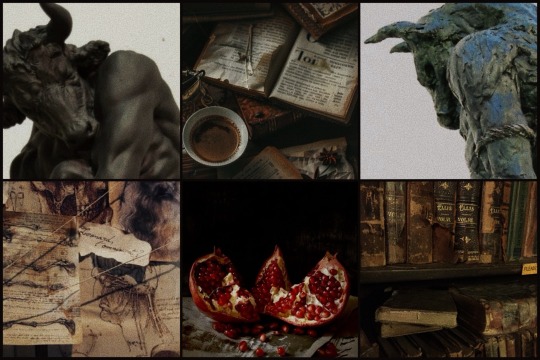
Escapism 🍂
18+ Minotaur x Gender Neutral Reader
(Size difference, Breeding, reader has afab anatomy)
DogWitch Notes: Thank you guys for the love on my last story! It makes me so happy to know people are enjoying my work :) this one has a little more build up but it might call for multiple chapters?
Summary: The library is off limits after dark but knowledge waits for no one. Besides, reading mythology is much more immersive at night. So immersive, in fact, that the breath on the back of your neck feels very, very real.
You had been crouching behind the bookshelf for so long now your legs were starting to loose feeling. Finally, though, the university librarian had finished making his checks and began turning out the lights. He was an anxious looking man in his thirties and you felt a little bad deceiving him like this- after all, it was him that had given you the book in the first place. But the tome was a relic that couldn’t leave the library to be read in your dorm room and you were so desperate to finish it. So, since stealing seemed a bit dramatic, you would have to settle for trespassing. You heard the large wooden door echo closed and dragged yourself from your hiding place, book still clutched to your chest. Your eyes took some time to adjust to the darkness as you dug around in your pocket for your lighter. Slivers of moonlight through the window seemed to die in the shadows of the towering book cases. They looked almost identical to the grand towers of the university in the darkness and the chill in the air gave you the feeling of walking through the streets at night.
Lighter in hand, you slowly navigated the corridors to find your much beloved reading corner and lit the candles you had left there. The little corner of light looked so cozy and you smiled as you gathered yourself up in the blanket you had bought and settled down in the old armchair with your book. The title ‘Portentum Complexus’ was embossed in gold into deep red leather. Much of the writing was still in the original Latin and you had been taking your time to carefully translate. However there were passages written in English, seemingly added by a scholar years later as well as beautiful etched illustrations. From all of these pieces, you had managed to put together a tale of a strange beast, roaming the land to find his lost lover. There had been a great war between worlds and the beast was trying to bring life back to his realm. Though the creature was described as being a hulking monster, triple the size of any man, covered in corse hair, obsidian black horns and pointed hooves; he still had a gentle feel about him. There was a sadness in the Latin passages that didn’t seem to properly translate into English. Perhaps that was why previous scholars hadn’t bothered to do so. But you poured over them, wanting to find the words to understand this creature who everyone, bar the monsters of his realm, was so afraid of. Your heart hurt for him a little; after all, he was looking for his love, he must feel so alone.
So this was how you intended to spend your night, curled up on the moth bitten armchair reading about lamenting fictional creatures. University was certainly the right choice. You flicked to the last English passage you had been studying. The beast had been captured by a human army and, not wishing to harm them by fighting back, had ended up bound by thick ropes in the king’s dungeon.
‘The corse binding bit into his soft flesh as he cried out into the empty corridors. He cried for his love, for his mate. He cried for them to find him in this cold and lonesome maze. His sorrow echoed from the cold stone and surrounded him.’
A sudden noise broke you from your immersion. It sounded like the lowing of cattle, strange since you were in the city centre. It was quickly replaced by the constant groaning of the ancient building before you could pay it much mind. The library was surprisingly noisy at night.
‘The beast cried until his throat was horse and even the reflection of his own voice left him alone. He feared he was to die here in the darkness. He spoke a silent prayer to the gods that his love might be safe. His chest heaved against its restraints as the monster resigned himself to his fate.’
Again came that noise, closer now, and sounding more laboured. You looked around but saw nothing in the darkness. Your mind must be playing tricks, you knew you shouldn’t really be here after all.
‘Movement. Movement in the darkness. The beast stirred and strained to see who approached him. Staring, wide eyed and loving through the bars of his captivity there stood…’
The words cut off back into Latin. You sighed and contemplated packing in for the night, translating seemed a tiresome chore at this hour. But something kept you going, call it intellectual curiosity. You needed to know what happened to the monster you had grown so fond of. Slowly but surely, word by word, you uncovered each sentence.
‘His love. His love had come to rescue him. They picked at the lock and made their way inside. The beast stared in disbelief. After all this time, all this searching, his love had been the one to find him. They approached with caution, unsure whether they recognised their mate after all these years. “Please, do not be afraid my heart, it is me.”’
The voice startled you. You read the words but they seemed to come from behind you. You turned again but again saw nothing but empty corridors through towering shelves. Perhaps your love of escapism had just left you with a very vivid imagination.
‘His love came forward, running their hands over the restrains that bound their lover. With a deft hand and a sharp blade, they began to cut through the rope. The beast sighed in relief as the pressure on his chest was released.’
The back of your neck tingled as a warm gust of air blew through the library. You could not shake the feeling you were being watched now but the story had you too gripped to care.
‘Like felled serpents, the ropes lay limp on the stone floor and the beast rose up from his stupor. He towered above his lover but they were not afraid. They knew he could not hurt them nor anyone else. They were bound together by fate and they would always find their way back to one another.
“My love. My heart. Please, I have craved for you endlessly. Let me hold you and make you mine once more.”’
Without warning you were pulled into a sudden embrace that knocked the air from your lungs. In your confusion, you did not even scream as large hands pulled you bodily from your chair. You were suddenly being held against a wall of corse fur, inhaling the bitter sweet of hay and sweat. You look up to see, towering over you in the candle-kissed half light, a great Minotaur.
He held you flush to his soft, strong chest as though you weighed nothing at all. His breath was hot on your skin and as a rough, black tongue ran up your neck making you shiver. “My mate…” The creature’s voice was low and surrounded you just as fully as his embrace, “How I’ve longed for this.” With one sweep of his arm, the Minotaur sent your books and papers fluttering to the ground. You had to crane your neck to gaze up at him as he placed you down on the desk; his dark eyes bore into you with such deep lust that you couldn’t help a pang of arousal coursing through your body. Nobody had ever looked at you this way. The great beast stood tall over you, taking in your body like he wanted to consume every part. You felt then, something hot and heavy resting next to your thigh. Your face flushed red and you had to look away for a moment, suddenly finding yourself embarrassed as the obscenity of the situation dawned on you. The creatures cock was longer than your thigh and just as thick. It made sense with the rest of his towering form but you were suddenly feeling very exposed under the beast’s hungry glare. He seemed to notice your hesitation and cupped your face in his palm, tilting your head to look at him. “Do you fear me?” Despite it all, you shook your head. Embarrassed? Yes. But not afraid.
“I shall endeavour to be as gentle as I can. You are to bear my calfs after all, it is my duty to treat you well.”
Before his words could register, the creatures head was between your thighs. He had ripped away the fabric there and his thick, rough tongue was lapping at your folds like a man starved. A cry of pleasure escaped your lips as you threw back your head. Your thighs clenched around his head, seemingly spurring him on. His tongue began to push deeper, curling inside you and igniting every nerve in your body. A single finger, large enough that you could wrap your hand around it, began to toy with your clit, rolling in gentle circles as you struggled to hold back wanton moans. He seemed to revel in the sounds you made, thrusting his tongue deeper inside with every whine of pleasure until you were rocking your hips desperately against his snout.
You were sure you were about faint from the overwhelming sensation of it all when the creature finally pulled his head back to see his work. You were a drooling mess against the table, slick and stretched open all for him. Still not open enough to take him inside you. A chuckle echoed above you, as though he had read your panicked look. “No, not here. Once we are home, my love, I will have you completely. But for now…” He picked you up with one hand around your waist, the other positioning his cock beneath you. “For now I have other ways to fill you.”
He began pulling you up his length, fucking in between your thighs and coating himself in your slick. He groaned deeply as he used your body to pleasure himself as if you truly belonged to him alone. You couldn’t help but let out your own whimpers of pleasure as your clit rubbed against his rough skin, getting wetter with every thrust. You found yourself wishing he were inside you, his scent, his growls, it all seemed so right, so familiar and you wanted to belong to this great beast that had captured you. You pressed your thighs together as tight as you could as he man-handled like you were nothing more than a toy made just for him. “That’s it, just like that..” he groaned. The muscles under the creature’s soft belly tightened and you knew he was close. “When we’re home I’m going to keep you full every minute of the day. I’ve spent too long without you. I’m going to hold you on my cock and fill you with my calfs until you’re stretched and moulded to my shape. No one else will be able to have you. You’re mine.” Without warning, he pinned you back to the desk and pressed his engorged tip against your entrance, stretching you around him. He let out a deep, echoing growl as he released inside you, filling you so much that you felt his cum leaking out of you and down your thighs.
The Minotaur didn’t seem satisfied to let this happen. He ran his fingers over your thigh and pushed the residue back inside you, fucking it deep into your stomach. You cried out with each thrust of his fingers, rocking your hips and riding out your waves of pleasure. It felt so good to be full of him.
You stayed there a while as he kissed and lapped at your skin, nuzzling into your neck and plugging you full with his fingers. He mumbled under his breath sweet nothings about how he would take you home, back where you belong. How he would keep you full and satisfied in every way. How you would give him such strong and beautiful young. How life would be so sweet now that his mate had been found. You tried to focus on his words, but they bought such a familiar peace that you found yourself lulled into sleep, breathing him in as you snuggled into his warm fur.
“That’s it my love, rest now. I will find you again soon”
***
It was the librarian who found you in the morning. He had gotten some idea of what was going to happen that night but was honestly surprised by the sheer amount of fluid involved. He tried his best to keep his eyes shut as he threw your blanket over your body and placed you back in your reading chair. The book he had lent you was open on the floor, displaying an etching of the Minotaur and his lover in an intimate embrace. The librarian quickly pushed it shut, not wanting to be anymore invasive into your private life. He thought about waking you, there were so many things he needed to tell you before the creature came back to claim his mate. But for now, you looked so peaceful.
He locked the library door, flipping the sign to closed and letting you get your rest.
DogWitch notes: a part two may be in order if you like??
Part two <3
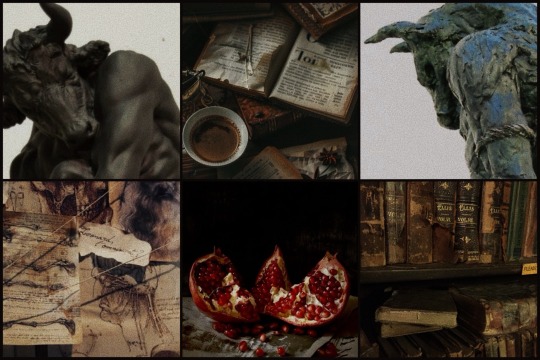
#monster x reader#monster nsft#monster imagine#nsft#monster smut#monster fucker#minotaur x human#minotaur x reader#monster x human#size difference#smut#minotaur
361 notes
·
View notes
Text
Luis fascinates the HELL out of me - he's both a relic and a survivor !

As someone who studies European history from the Reformation to Italy to the Spanish Inquisition (which was awful T-T), Luis as a character fascinates me, just as much as Valdelobos. Luis is in a sense, a relic. A person whom, until he left Valdelobos, was connected to centuries of deep culture that had not changed for hundreds of years. Valdelobos was a Catholic town at first, and they still recognize their Castllians as leaders over that of the modern world. Again, as a history geek, Valdelobos was probably pre Vatican II, in short, Luis can probably speak Latin as well. Luis, was not a normal Catholic. Luis' catholicism was very much like what we saw in Medieval times. And also, his form of Spanish.
In Spain, they do not speak the same dialect of Spanish as they do in other places in Latin America. Luis probably speaks Castillian Spanish, which is the European dialect of Spanish, that is not mixed with Indigenous languages or anything of the sort. Because that Spanish existed pre colonization of the Americas. But it gets even CRAZIER with Luis, because even the dialect of Spanish spoken in Spain today, would probably be much different from the dialect spoke in Valdelobos because they are isolated. They probably speak a less modern version of Spanish, probably still tied to the 1600rds.
Meaning that, aside from knowing English and Latin, Luis probably also knows various dialects of Spanish. He knows various dialects of Castillian spanish, he also has to LEARN how to speak Spanish when he got to the states so that people, who are of Latin American origin could understand him.
Luis is a relic, because he exists in various time periods. He exists in a town that is probably stuck somewhere between the 1500rds - 1700rds, yes like Tudor times! A town that was probably very much involved in European events and a town that has not grown past that. He exists in a town where an ancient dialect of Spanish was spoken , and where a very different form of Catholicism existed so that Luis learned Latin growing up because he had to so he could say his prayers. But he left ALL of that behind and modernized himself.
And he did it so well to the point where he easily passed for someone stuck in Valdelobos that doesn't belong there. He literally just looks like some guy when we meet him. When Leon sees him, you can't tell that this man is not really different from the cattle farmers who still speak in ancient languages, or who might not even know what a cell phone is, or who are hundred years behind. You don't know that Luis was at a point, disconnected like they were. He is literally just some guy. We don't even learn about how hard it was for him to adjust to this new life, but how he mastered it!!
A whole game, no a whole nOVEL could be made off of him.
anyway i refuse to believe he is dead lol. this man didn't survive cultural shock, being a relic, being exposed to new cultures, new ideas, etc., just to be killed by krauser lmaoooo

#luis sera#luis serra navarro#luis sera navarro#resident evil#re 4#re 4 remake#resident evil 4 remake#i am also obsessed with spanish medieval - renissance history and valdelobos fits into that kinda#leon s kennedy#leon kennedy
79 notes
·
View notes
Note
can i request any words/ phrases/ themes linking to the word ‘relic’?
Writing Notes: Relic

Relic - an object esteemed and venerated because of association with a saint or martyr; souvenir, memento
Relics - remains, corpse; a survivor or remnant left after decay, disintegration, or disappearance; a trace of some past or outmoded practice, custom, or belief
Reliquaries - the containers that store and display relics
Where the bones of martyrs are buried, devils flee as from fire and unbearable torture. —St John Chrysostom
Etymology
Middle English relik, from Anglo-French relike, from Medieval Latin reliquia, from Late Latin reliquiae, plural, "remains of a martyr", from Latin, "remains", from relinquere "to leave behind"
Related Words
Afterimage - a lasting memory or mental image of something
Artifact - an object remaining from a particular period
Corpus - the body of a human or animal especially when dead
Decedent - a person who is no longer living; a deceased person
Memento - souvenir
Oddment - something left over; remnant
Oeuvre - a substantial body of work constituting the lifework of a writer, an artist, or a composer
Remnant - a usually small part, member, or trace remaining
Souvenir - something kept as a reminder (as of a place one has visited)
Vestige - a trace, mark, or visible sign left by something (such as an ancient city or a condition or practice) vanished or lost
Martin Luther complained about the profusion of relics and the absurd claims being made for them: "What lies there are about relics! One claims to have a feather from the wing of the angel Gabriel, and the bishop of Mainz has a flame from Moses’ burning bush. And how does it happen that eighteen apostles are buried in Germany when Christ had only twelve?"
Examples
ANCIENT GREEK RELICS. At Athens the supposed remains of Oedipus and Theseus enjoyed an honor that is very difficult to distinguish from a religious cult.
BUDDHIST RELICS. Relics of the Buddha and various saints were (and still are) venerated. Following the Buddha's death, his bones and teeth were divided for the purpose of being used as relics in order to illustrate his teaching of impermanence (anitya). These relics were so valued that they caused armed conflict between factions for possession of them. Afterward, these relics were taken throughout Asia with the gradual spread of Buddhism.
CHRISTIAN RELICS. Since the dawn of Christianity, relics have been an important part of Christian devotionalism. During the Middle Ages, the selling of relics became a lucrative business. The concept of physical proximity to the “holy” was considered extremely important. A pilgrim's possession and veneration of a relic was seen as a means to become closer to God. Instead of having to travel hundreds of miles to become near to a venerated saint, a Christian could enjoy closeness with him/her through their relic at home.
MUSLIM RELICS. Although certain sects of Islam strongly discourage (or outwardly prohibit) the veneration of relics, a very large collection of Muslim relics is preserved in the Sacred Trusts, located in Istanbul, which contains more than 600 treasured pieces in the Topkapi Palace Museum.
The Roman Catholic Church makes a distinction between veneration and worship of relics and icons.
3 Categories of Relics According to the Vatican
First-Class Relics: Items directly associated with the events of Christ's life (manger, cross, etc.), or the physical remains of a saint (a bone, a hair, a limb, etc.).
Second-Class Relics: An item that the saint wore (e.g., sock, shirt, glove). Also included are items that the saint owned or frequently used (e.g., a crucifix, book). An item more important in the saint's life is considered a more important relic.
Third-Class Relics: Anything that has touched a first- or second-class relic of a saint.
Sources: 1 2 3 4 5 6 7 ⚜ Writing Notes & References
Hope this helps! Do tag me or send me a link to your writing if it does. I'd love to read your work.
#anonymous#writing notes#relics#writeblr#spilled ink#dark academia#writing reference#writers on tumblr#writing prompt#poets on tumblr#literature#poetry#religion#creative writing#writing inspo#writing ideas#writing inspiration#writing resources#langblr#linguistics#words#history
69 notes
·
View notes
Text

[Title Page]
COMPENDIUM OF DEMONOLOGY AND MAGIC (c.1775) 32 watercolors [Most NSFW]
‘A selection of pages from an eighteenth-century demonology book comprised of more than thirty exquisite watercolours showing various demon figures, as well as magic and cabbalistic signs. The full Latin title of Compendium rarissimum totius Artis Magicae sistematisatae per celeberrimos Artis hujus Magistros, roughly translates to "A rare summary of the entire Magical Art by the most famous Masters of this Art". With a title page adorned with skeletons and the warning of Noli me tangere (Do not touch me), one quickly gets a sense of the dark oddities lurking inside its pages. The bulk of the illustrations depict a varied bestiary of grotesque demonic creatures up to all sorts of appropriately demonic activities, such as chewing down on severed legs, spitting fire and snakes from genitalia, and parading around decapitated heads on sticks. In additon there seem also to be pictures relating to necromancy, the act of communicating with the dead in order to gain information about, and possibly control, the future. Written in German and Latin the book has been dated to around 1775, although it seems the unknown author tried to pass it off as an older relic, mentioning the year 1057 in the title page.’ source [Public Domain Review]








Additional sources:
source [Wellcome Institute for the History of Medicine]
source [All That’s Interesting]
50 notes
·
View notes
Text
HSR’s Guns & Roses: Analysis of Boothill & Argenti
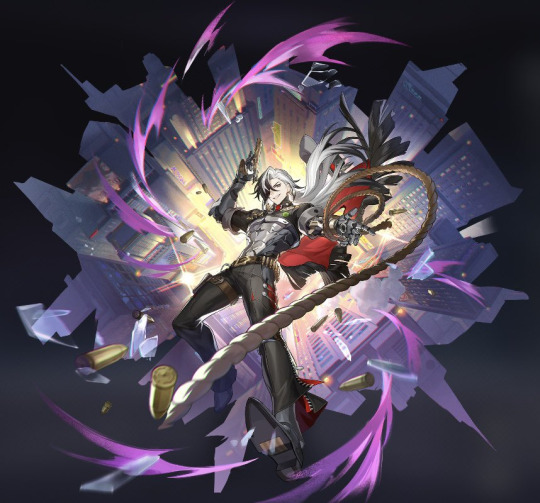
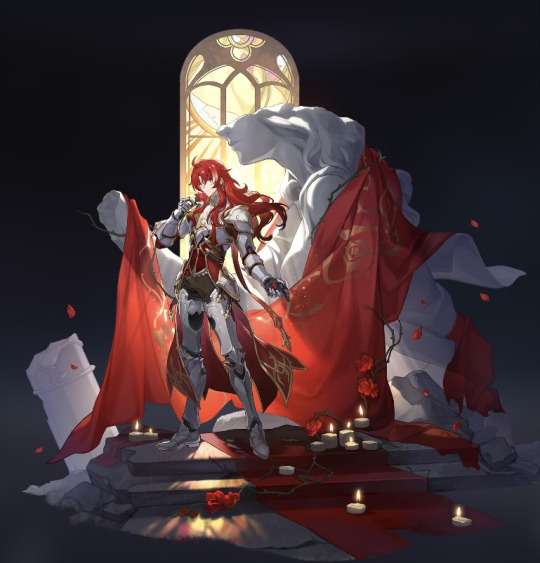
****Possible spoilers ahead, esp. Boothill’s & Argenti’s lore****
With Boothill out now, I’ve been very intrigued by the Boothill & Argenti duo which I’ve noticed so many details that are similar but also different about them, some of which many people may have already noticed but I still would like to analyze them since it’s been a hot minute since my last lore thread
The main aspects of these 2 characters that I want to talk about are their gameplay, characteristics, and lore/backstories
When we look at their gameplay, some details stand out; for example, both have the same element (physical) but opposite paths when it comes to their DPS roles (Boothill is Hunt which specializes in single target fights & Argenti is Erudition which specializes in dealing dmg to multiple enemies)
Their weapons are also opposites of each other where guns are ranged & the lance is typically used in close combat
This is more of a coincidence which I tweeted about recently but I still think it’s funny that their best-in-slot relics can be found in the same cavern of corrosion

Next we’ll look at their characteristics by which I mean their personalities & designs; off the bat we can see that Boothill has a more gruff personality & if he weren’t censored by his synesthesia beacon, he would be the sole reason for bumping HSR to a higher audience rating; this man probably would not hold back on the expletives 😂)
Meanwhile Argenti is shown to be very kind with his words, often using compliments & praises; typically he speaks with levelheadedness & grace, just like how we imagine a knight would speak
If we think about it, Boothill & Argenti are both very flamboyant characters but in different fonts; just look at their demo trailers as references since they both move like dancers (Argenti looks like he’s in a graceful ballroom dance while he’s fighting the swarm disaster; Boothill straight up MOONWALKS while dodging bullets from the IPC, we literally went from Marilyn Monroe to Michael Jackson 😂)

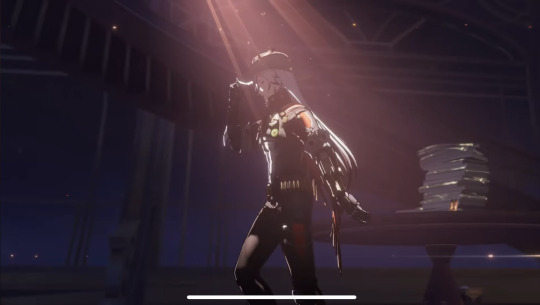
What accentuates their flamboyance even more is the way they both have spotlights on them at various points of their demo videos
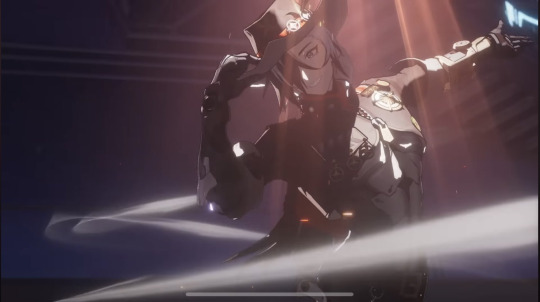
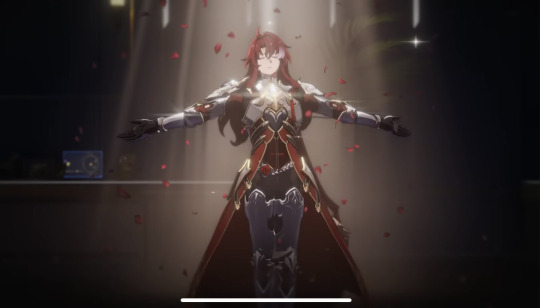
Bonus shot of Boothill being so extra (read: fabulous) while fighting:
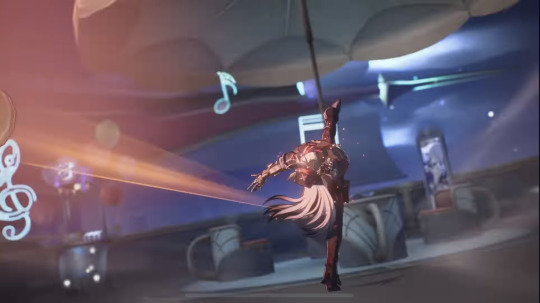
They also have very flamboyant designs which makes them stand out (as Boothill explains, they’re both clad in silver which definitely is one of the first things you would notice when looking at them); I don't know how much value silver has in this universe but it is considered a precious metal & valuable to us due to its many uses which is thanks to its malleable nature
Another thing to point out is that Argenti is based off the Latin word for silver argentum; fun fact, the Latin translation is the reason why the symbol for silver on the periodic table is Ag :3
I feel like their color palettes are a bit similar (silver, red, black) but they also have varying degrees for shared colors, specifically red & black; from a visual standpoint, this goes very well because Argenti having more red helps to emphasize his association to roses & Boothill having more black helps to emphasize his identity as “death” (well, for the IPC at least)
Moving onto their lore, although Argenti doesn’t have lines about Boothill, we do get lines about Argenti from Boothill himself; based on Boothill’s voicelines, we can assume that he holds some respect for Argenti as someone to whom he can relate
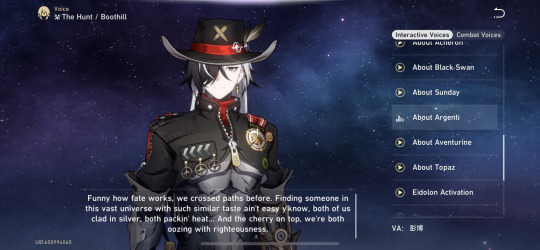
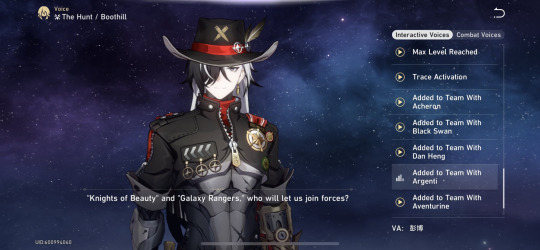
Their backstories are quite similar when we take a closer look at them
For example, they both have experiences where they lost their homes & the people important to them (damn, HYV really said you’re gonna suffer 💀)
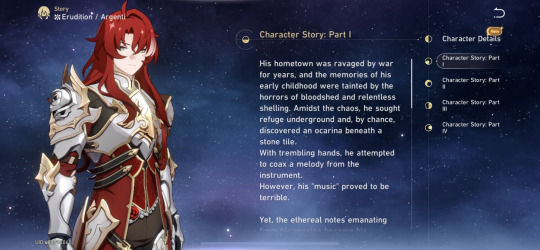
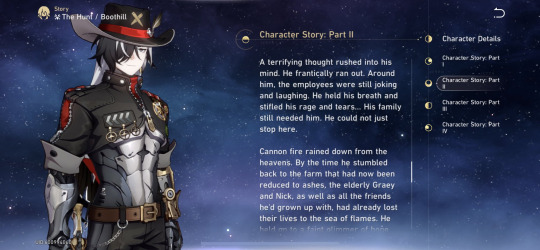
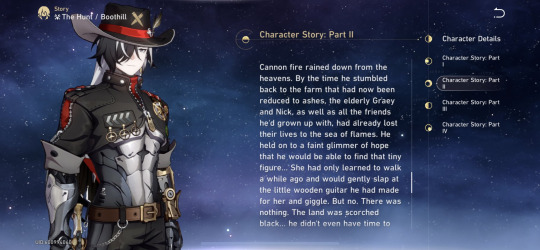
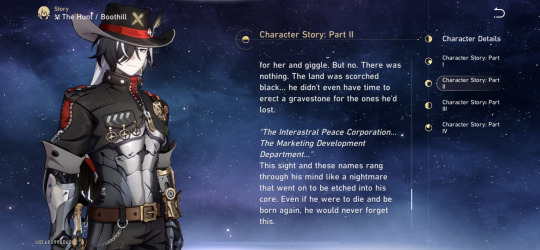
Their respective factions are both noted to be groups of solitary people
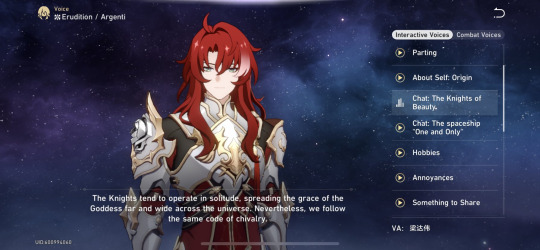
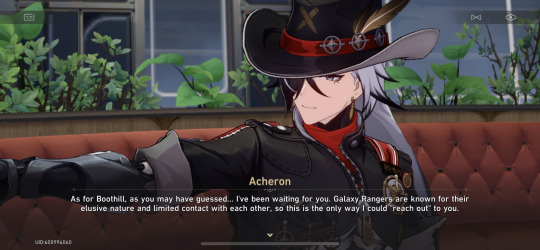
Interestingly the factions have different reputations according to the data bank where the Knights of Beauty are looked down upon & the Galaxy Rangers are seen as heroes which may be a bit different from what we’re used to since knights normally have a positive connotation as people who hold chivalry as one of their most important values
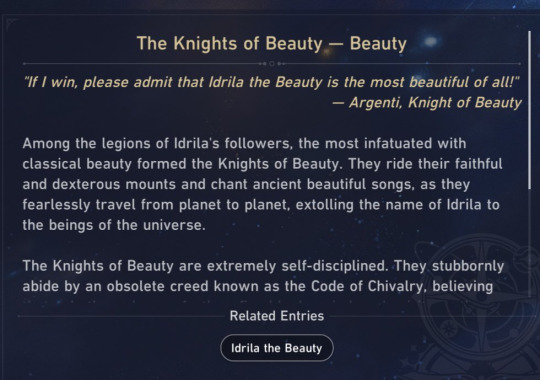
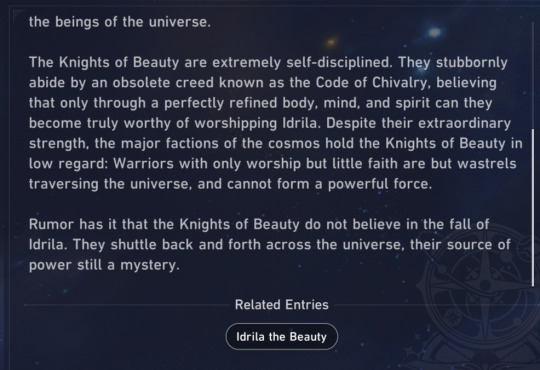
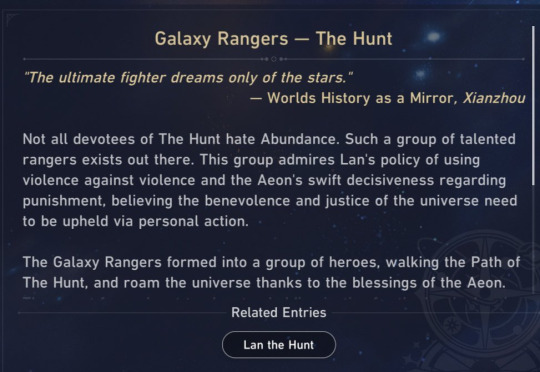
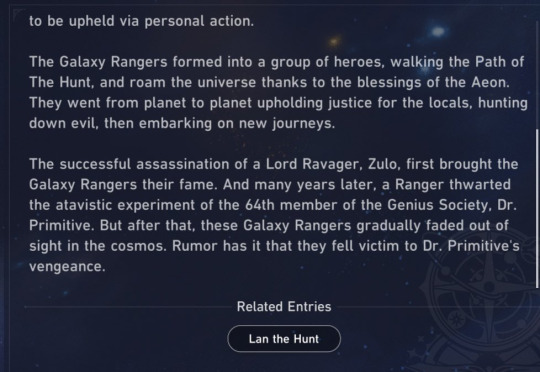
Their goals are similar in the way that they both are looking for a specific person or entity: Boothill is looking for Oswaldo Schneider (who is responsible for the loss of his family & home; we might possibly meet him soon since we ended off 2.2 with the cliffhanger where Boothill confronts Aventurine to ask him where Oswaldo is) & Argenti is looking for Idrila the Beauty
They also have their critical turning points in their respective Character Story Part 3 portions
Boothill’s portion talks about his transformation into a cyborg & his adoption of the name “Boothill” which he explains is what they called gunslingers who ended up dead; it is a clear representation of his old self having died along with his loved ones & his home when the IPC destroyed everything
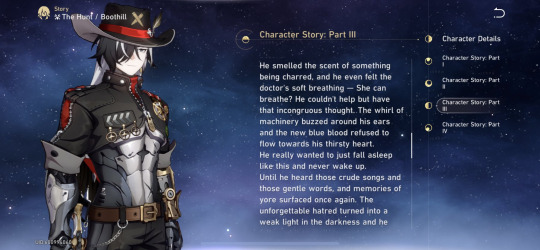
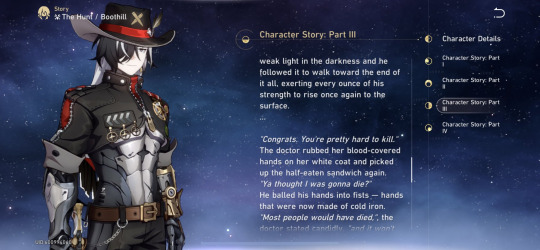
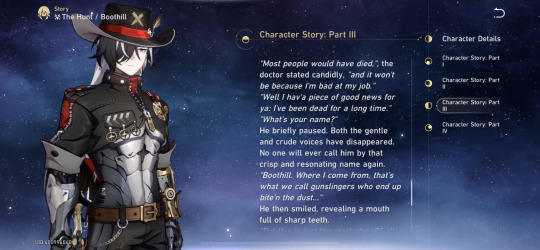
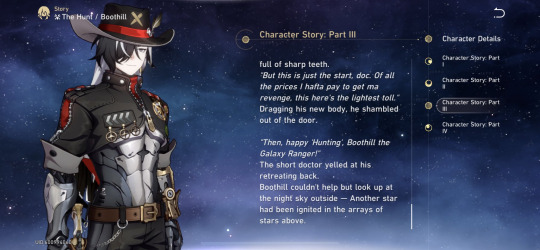
Argenti’s portion talks about his journey as a new Knight of Beauty & the obstacles he faced after having met the knight that was mentioned in his Part 2; here we see his transformation into a Knight of Beauty & his dedication to the path he walks
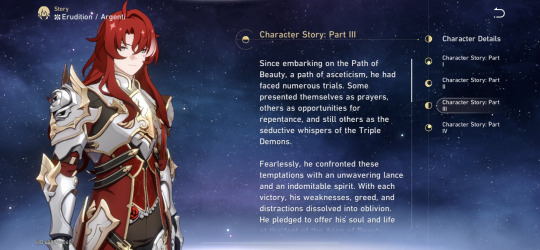
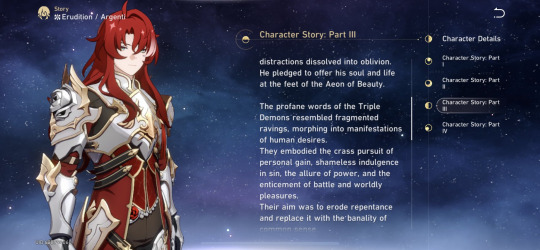
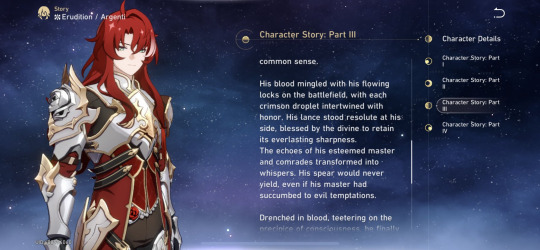
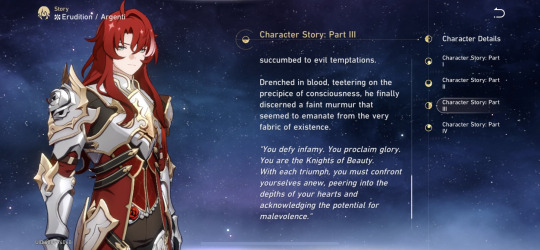
Before I had mentioned silver being an important part of their designs; here I think is where we see the importance of silver the best (since silver is a malleable material, it can change its meaning for both characters based on their situations)
To reiterate, becoming a cyborg by replacing his body w/ silver represents Boothill saying goodbye to his old self who knew of happier times & his loved ones; for Argenti, the silver that he wears is a sign of his devotion to Idrila the Beauty
What ties their differences so well in my eyes is that silver acts as a symbol of Boothill’s & Argenti’s resolve to accomplish their goals (silver may be malleable but it still can be strong metal & it’s even better since Argenti does talk about his will/faith being unbreakable)
I truly love their dynamic as complementary foils & I really hope that we’ll be able to see more interactions between them in the future since we just only have Boothill’s voicelines about Argenti but considering their goals, it probably won’t happen, at least not any time soon
Let me just say that I only cooked this idea up after listening to Boothill’s demo trailer on repeat…..a normal amount, I’m so normal about him 🙂🙂🙂🙂
Thank the YEEHAW man :3
#honkai star rail#hsr#honkai star rail spoilers#honkai star rail lore#hsr spoilers#hsr lore#hsr boothill#hsr argenti#character analysis
134 notes
·
View notes
Text
Now here’s a divine development.
Just ahead of the holidays, archaeologists have “digitally unrolled” a 1,800-year-old silver amulet to decipher an inscription that’s being hailed as the oldest known evidence of Christianity in Europe.
Authentic evidence of pure Christianity north of the Alps has never existed before now. And the findings have the potential to change holy history forever.
“It will force us to turn back the history of Christianity in Frankfurt and far beyond by around 50 to 100 years,” said Mike Josef, mayor of Frankfurt, Germany, where the artifact was exhumed.
“The first Christian find north of the Alps comes from our city,” added Josef. “We can be proud of that, especially now, so close to Christmas.”
The amulet housed a “wafer-thin” foil, measuring 1.4 inches, and featuring text referred to as the “Frankfurt silver inscription.”
It was found beneath the chin of a man’s skeleton at a burial site on the outskirts of Frankfurt in 2018. However, the ancient wording, dating back to between 230 and 270 — when the predominant religions in Europe were Judaism and paganism — has been virtually illegible until now.
Specialists from the Leibniz Center for Archaeology (LEIZA) used computer tomography (CT) scans to decode the 18-line engraving, which declares Jesus Christ the “Son of God.”
“In the name of Saint Titus. Holy, holy, holy! In the name of Jesus Christ, Son of God! The Lord of the world resists with [strengths] all attacks [or setbacks]. The God grants entry to well-being. May this means of salvation protect the man who surrenders himself to the will of the Lord Jesus Christ, Son of God, since before Jesus Christ every knee bows: those in heaven, those on earth and those under the earth, and every tongue confesses (Jesus Christ),” reads the translation, per DailyMail.
The deific discovery closely trails the recent decrypting of the Meggido Mosaic, a 1,800-year-old relic that says, “Jesus is God.” It also follows the July 2024 unearthing of a nearly 2,000-year-old manuscript that details the earliest known account of Christ’s childhood.
To crack the code on the Frankfurt silver inscription, which is written in Latin, LEIZA experts used sophisticated technologies on the extremely delicate scroll.
“The challenge in the analysis was that the silver sheet was rolled, but after around 1,800 years, it was of course also creased and pressed,” Ivan Calandra, an archaeologist at LEIZA, said in a statement. “Using CT, we were able to scan it at a very high resolution and create a 3D model.”
The pros reportedly placed individual segments of the scan together, piece by piece, until most of the words were visible.
However, there are said to be a few gaps in the text — which is being dubbed “purely Christian” as it spotlights Jesus Christ and Saint Titus, a missionary and church leader, but avoids pagan themes as well as elements of Judaism.
Professor Markus Scholz, an archaeologist from Goethe University in Frankfurt, helmed the deciphering efforts.
“I called in experts from the history of theology, among others, and we approached the text together, piece by piece, and finally deciphered it,” said Scholz, who was surprised that the etchings were in Latin.
“Such inscriptions in amulets were usually written in Greek or Hebrew,” he noted.
And while little is known about the man who was buried with the amulet, scientists reportedly believe that he was a devout Christian — although believers of the faith were still subject to persecution at the time of his death.
According to insiders, the late Jesus-lover likely wore the amulet on a cord around his neck for protection before transitioning into the afterlife. His grave also boasted an incense bowl and a jug made of fired clay.
Researchers consider him the “first Christian north of the Alps,” and speculate that there could be more historical, untapped Christian burial sites around Europe.
“This extraordinary find affects many areas of research and will keep science busy for a long time to come,” said Ina Hartwig, Frankfurt’s head of culture and science.
“This affects archaeology as well as religious studies, philology and anthropology,” she continued. “Such a significant find here in Frankfurt is really something extraordinary.”
#nunyas news#well that's all kinds of cool#doen't upend a thing either#just confirms what we already know
36 notes
·
View notes
Photo

Third Crusade
The Third Crusade (1189-1192 CE) was launched to retake Jerusalem after its fall to the Muslim leader Saladin in 1187 CE. The Crusade was led by three European monarchs, hence its other name of 'the Kings' Crusade'. The three leaders were: Frederick I Barbarossa, King of Germany and Holy Roman Emperor (r. 1152-1190 CE), Philip II of France (r. 1180-1223 CE) and Richard I 'the Lionhearted' of England (r. 1189-1199 CE). Despite this pedigree, the campaign was a failure, the Holy City never even being attacked. Along the way, there were some victories, notably the capture of Acre and the battle of Arsuf. Fizzling out with a whimper, the Crusade collapsed because, by the time they arrived at their objective, the western leaders found themselves without sufficient men or resources to resist the still intact armies of Saladin. Although a compromise was negotiated with access for pilgrims to Jerusalem permitted and a Christian foothold maintained in the Middle East, another attempt to take the Holy City would shortly be made the original objective of the Fourth Crusade of 1202-1204 CE.
The Fall of Jerusalem
The Second Crusade (1147-1149 CE) had effectively ended with the complete failure to take Damascus in Syria in 1148 CE. The various Muslim states in the Middle East then realised that the once-feared western knights could be defeated and the precarious existence of the Crusader-held territories, the Latin East, was starkly highlighted. All that was needed now was a unification of Muslim forces and this was provided by one of the greatest of all medieval rulers, Saladin, the Sultan of Egypt and Syria (r. 1174-1193 CE).
Saladin, the founder of the Ayyubid dynasty in Egypt, took control of Damascus in 1174 CE and Aleppo in 1183 CE. Saladin then shocked the world by defeating the army of the Kingdom of Jerusalem and its Latin allies at the Battle of Hattin in 1187 CE. Thus, Saladin was able to take control of such cities as Acre, Tiberias, Caesarea, Nazareth, Jaffa and even, the holiest of holies itself, Jerusalem. Remarkably lenient with his Christian captives compared to the butchery of the First Crusade (1095-1102 CE), after the recapture of Jerusalem almost a century earlier, Saladin accepted ransoms from those Latin Christians who could afford to buy their freedom and enslaved the rest. Eastern Christians were permitted to remain in Jerusalem as a protected minority group. The Latin East had all but collapsed, only Tyre remained in Christian hands, under the command of Conrad of Montferrat, but it would prove a useful foothold for the coming fightback.
Pope Gregory VIII only reigned for a few months in 1187 CE but, in October of that year, he made a lasting impact on history by calling for yet another crusade to win back Jerusalem and such lost holy relics as the True Cross. Nothing less than a repeat of the remarkable feat of the First Crusade would do. No fewer than three monarchs took up the Pope's challenge: the Holy Roman Emperor, Frederick I Barbarossa, king of Germany, Philip II of France and Richard I of England. With these being the three most powerful men in western Europe, the campaign promised much.
Continue reading...
77 notes
·
View notes
Text
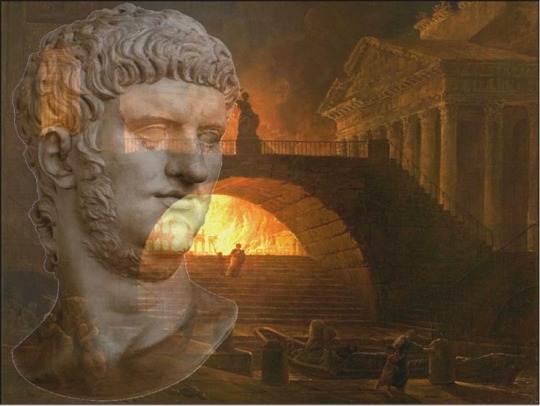
Nero: The end of the Julio-Claudian dynasty (Part III)
The big fire of Rome (known in Latin as Incendium Magnum Romae) 18th July of 64 (Roman year 817)
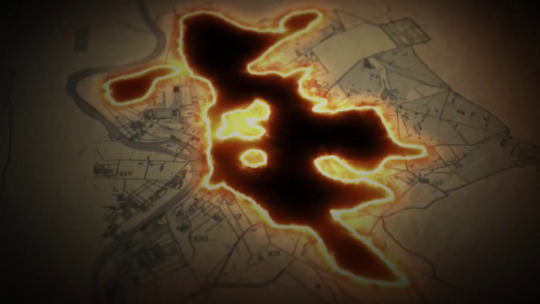
From 'The Annals' by Tacitus:
Nero at this time was at Antium, and did not return to Rome until the fire approached his house, which he had built to connect the palace with the gardens of Maecenas. To relieve the homeless he opened the Campus Martius, the public buildings of Agrippa, and even his own gardens, and raised temporary structures to receive the destitute multitude. Supplies of food were brought up from Ostia and the neighbouring towns. After five days, an end was put to the conflagration at the foot of the Esquiline hill. But before people had laid aside their fears, the flames returned, with no less fury this second time, and especially in the spacious districts of the city. Although there was less loss of life, the temples of the gods, and the porticoes which were devoted to enjoyment, fell in a yet more widespread ruin. Rome, indeed, is divided into fourteen districts, four of which remained uninjured, three were levelled to the ground, while in the other seven were left only a few shattered, half-burnt relics of houses. Some people noticed that the beginning of this conflagration was on the 18th of July, the day on which the Senones (Gallic tribe) attacked Rome. Others have pushed a curious inquiry so far as to reduce the interval between these two conflagrations into equal numbers of years, months, and days.
Tacitus also writes that the favorable things that Nero did were soon nullified, for a rumor spread that he was singing and playing the lyre while Rome burned. Tacitus assures that it was such rumor caused another event in Rome.
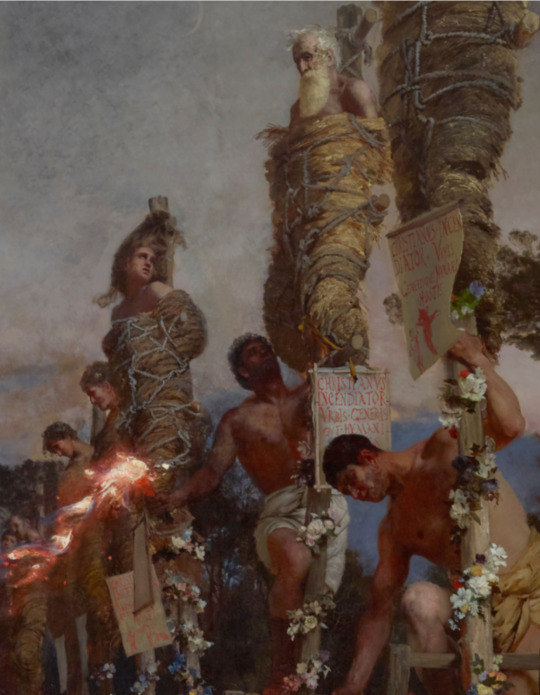
'Nero's Torches' (detail) by Henryk Siemiradzk, 1876
" Therefore, to put an end to this rumor, Nero invented culprits and subjected to very refined punishments to those hated by the populace, called Christians.
The origin of this name was the so-called Christus, who had been condemned to torture and crucifixion during the reign of Tiberius at the hands of one of our procurators, Pontius Pilatus; And a most mischievous superstition, thus checked for the moment, again broke out not only in Judaea, the focus of this disease, but even in Rome, where all things hideous and shameful from every part of the world find their centre.
At first those who confessed were arrested, then, after their denunciation, a huge crowd was condemned, not so much for the accusation of the fire, but for hatred of the human race.
In addition, the mockery of those who were going to die was added: covered in wild skins, they died torn to pieces by dogs, or were either crucified or condemned to the flames and to serve as torches when daylight had expired. Nero offered his gardens for the spectacle.
Although they were criminals, deserving of very severe punishments, a feeling of pity arose, since they were murdered not for the common good, but for the ferocity of a single man." Tacitus
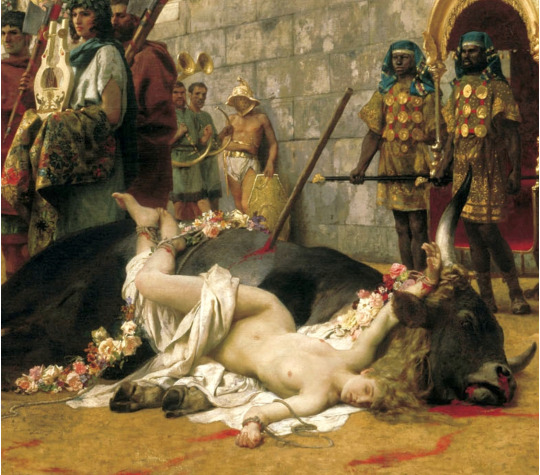
'A Christian Dirce' (detail) by Henryk Siemiradzki , 1897
During the reign of Nero, Christian community in Rome was small. They were mainly slaves, freedmen, and converted Jews of humble origins like their leader, the apostle Peter.
Was this really the first persecution of Christianity?
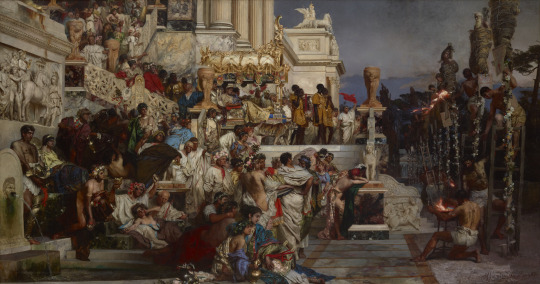
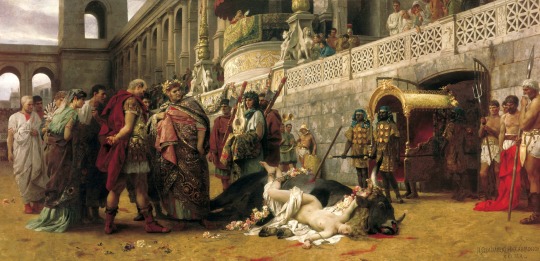
According Tacitus those innocent people were executed for supposedly burning Rome, or rather because Nero wanted to get rid of a rumor that accused him of the fire, not for their religious beliefs.
And after those events Nero dedicated himself to the project of rebuilding the city and there is no record of any other persecution of Christians during the rest of his reign.
The Catholic Church, which keeps a rigorous record of all its martyrs except for the apostles Peter and Paul, does not mention any saint who was “martyred during the reign of Nero,” which I find surprising given what Tacitus wrote.
The fact that the two most prominent Apostles of Christianity were executed in Rome during the reign of Nero is in all likelihood the reason why this emperor is considered the paradigm of the Antichrist and the first enemy of christians in history.
Was it really Nero who accused the Christians?

'Nero at Baiae' by Jan Styka, circa 1900
Tacitus accounts that Nero returned to Rome and helped the people in the disaster, but adding:
"These acts, though popular, produced no effect, since a rumour had gone forth everywhere that, at the very time when the city was in flames, the emperor appeared on a private stage and sang of the destruction of Troy; comparing present misfortunes with the calamities of antiquity"." (The Annals XV)
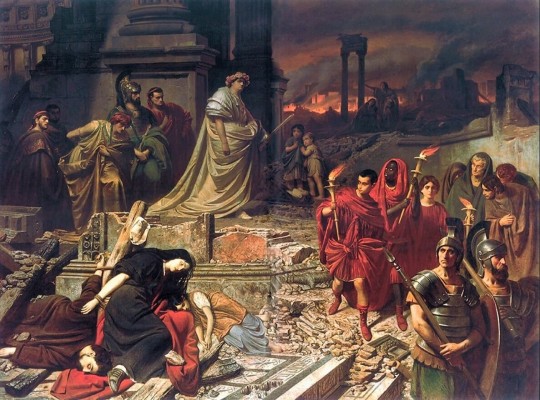
Is it possible that people in Rome who had seen Nero in action during fire believed this story? Or could it be that such a rumor never existed but was created by the Roman historians many years later?
Tacitus also accounts the Christians were "detested by the populace." So, isn't it more credible to think that someone among the immense populace could have accused the Christians of burning the city? Is it possible that the false accusation reached Nero directly and that this was the true reason for the arrests and executions ?
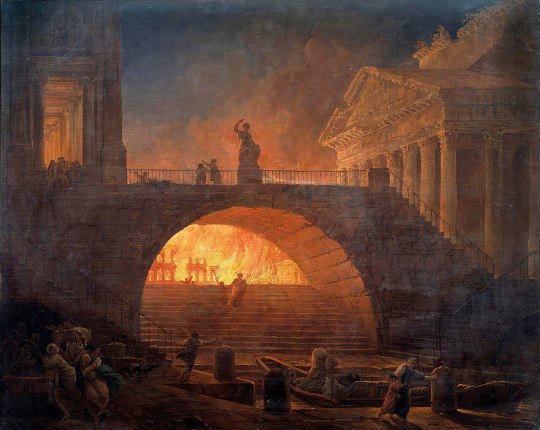
'The Fire of Rome, 18 July 64 AD ' by Hubert Robert, 18th century
Last Part
61 notes
·
View notes
Note
the two skeletons may reveal the death of the Princes? 👀
I'm not super familiar with this topic, tbh. From what I can understand, it's possible, but it's equally possible that DNA testing may not actually prove or reveal anything regarding the Princes.
Context: In 1674, workmen found two skeletons in a wooden box in the Tower of London, where they had been buried 10 feet under the staircase leading to the chapel of the White Tower. Charles II ordered the bones to be reinterred in Westminster Abbey in 1678, and a Latin inscription written at that time translates to: "Here lie the relics of Edward V, King of England, and Richard, Duke of York".
In 1933, the bones were examined by Lawrence Tanner, William Wright and George Northcroft, who concluded that they belonged to two children around the correct ages for the Princes, and that one skull showed evidence of death by suffocation. No further scientific examination was conducted, although many believe that re-examination with improved techniques and DNA sampling could provide a more accurate analysis. However, to disinter a body from the Abbey, permission has to be granted from the reigning monarch (ew), which has not been granted as of yet.
Many members of the R3 Society hope that the bones will be proved not to be the Princes, because they feel like it will vindicate Richard due to the absence of explicit, tangible evidence of their deaths. Those who believe Richard III was guilty (he was) believe that if the bodies were the Princes, it would prove they were murdered. If examinations reveal that were the Princes, and reveal manner of death was violent, then yes, the latter seems reasonable. But we don’t know what will will show up in the results - if they are ever allowed - and it's entirely possible it won't matter to the current case.
To quote @seethemflying from this post:
“Most scholars agree it will not actually prove anything at all. If the bones are the princes, it just proves that they died in the Tower, not who murdered them. If the bones are not the princes, it just means these bones belong to someone else. The Tower of London is old, and was built on part of Londinium's Roman wall. Pre-medieval and even Roman human remains have been found on the site before, it wouldn't be a surprise if these bones dated to any point before the 17th century […] Whether the bones are or are not the princes can therefore do little to answer the central questions about who killed these little boys.”
For example, there are a few sources - both contemporary and post-contemporary - that suggest water may be involved in the Princes' "disappearance" (murder). We don't know the exact circumstances, but if the Princes were disposed off in such a manner, we cannot expect to ever find their bodies.
Ultimately, regardless of the identity of the two skeletons, the Princes were almost definitely were murdered, and Richard III was almost definitely the one who murdered them. We do not know it "for sure", the same way we do not know "for sure" if Arthur of Brittany, Edward II, Richard II and Henry VI were murdered (and how), but all of them almost definitely were and it’s simply disingenuous to pretend otherwise. It’s equally disingenuous to act as though all the above-mentioned cases were clear-cut examples of murder while the case of the Princes is somehow a more Complex and Confusing one which you have to choose your words more carefully over when it's....really, really not (see: the matter-of-fact way they talk about John and Arthur VS Richard and the Princes). Either you should analyze all these cases with the same level of assertion/uncertainty, or don't analyze them at all.
Also, contrary to the claims of Ricardians, who believe that nobody accused Richard III until the Tudors, there are a range of independent contemporary sources who firmly believed he killed his nephews. It also makes zero sense for Elizabeth Woodville, Elizabeth of York and Edward IV's supporters, who were the ones to raise Henry Tudor as an active claimant to challenge Richard III in the first place, to endorse Henry in any way if they thought that Edward V or Richwrd of Shrewsbury might still be alive. The fact that they did can only mean that they knew/believed that the Princes were dead (though I think there was considerable ambiguity on the exact circumstances behind those deaths). It's simply illogical to pretend otherwise.
#ask#sorry but I'm really fed up with how much people have to walk on eggshells when discussing the Princes#(and Edward II as well tho I don't think it's comparatively as widespread in popular history as that of the Princes)#(also the way a few blogs/historians are now trying to argue Henry VI actually died of grief...please Stop)#it's really zero steps forward 10 steps back 🤡#we don't explicitly tangibly know if they were murdered. we don't explicitly tangibly know 90% of things in history#but you can still use your brains and come to the only logical conclusion possible which is the fact that they undoubtedly were#princes in the tower#english history#edward v#richard of Shrewsbury
20 notes
·
View notes
Text
youtube
When I was a child in the '80s, I absorbed some kind of cultural truism that disco was ridiculous, embarrassing, cheesy, a cultural relic to be mocked at every turn. Remember, I'm under ten years old at this time, and I still manage to get this impression. There was another, milder sea change when grunge overtook the hair metal of the late '80s, so I never questioned the idea that disco should be dead and buried. We like silly things, I thought in my 13-year-old wisdom, and then we get over it.
Then I saw The Last Days of Disco (1998) while I was in college, and suddenly I realized that disco was fun, and it was like—it was in the roots of—music I already loved. And the end of that movie also—hints? tells you? I can't remember how explicitly—that disco didn't just fade like most trends; it was killed off.
I watched a lot of VH1 in those days, the late '90s, with a little TV sitting on my tall university-issue dresser, its corner overlooking my computer desk while I struggled with piles of assignments. This was the heyday of Behind the Music, so it was great background TV. And then one day (1999) they ran a Donna Summer—the "Queen of Disco"—concert special. The video up there is the song that immediately became my favorite of hers. It’s just instant serotonin to me, any version of it. I bought the whole VH1 album on CD, and "This Time I Know It's For Real" may genuinely be one of my all-time favorite songs, now, still, more than 20 years later. You can hear the original version (1989) here (the backing instrumental that I just found today is lovely), but the live version ten years later, the video up there, has a really special comeback—joyous, gracious survival—energy to it.
Watching the whole concert, I got it. Why the fuck did I ever think disco wasn't amazing? It was always the kind of thing I loved; we had all just been pretending that it was embarrassing glitter trash.
And then I found out why we were pretending. From densely-footnoted Wikipedia:
Disco Demolition Night was a Major League Baseball (MLB) promotion on Thursday, July 12, 1979, at Comiskey Park in Chicago, Illinois, that ended in a riot. At the climax of the event, a crate filled with disco records was blown up on the field between games of the twi-night doubleheader between the Chicago White Sox and the Detroit Tigers. Many had come to see the explosion rather than the games and rushed onto the field after the detonation. The playing field was so damaged by the explosion and by the rioters that the White Sox were required to forfeit the second game to the Tigers. [...] The popularity of disco declined significantly in late 1979 and 1980. Many disco artists carried on, but record companies began labeling their recordings as dance music. [...] Rolling Stone critic Dave Marsh described Disco Demolition Night as "your most paranoid fantasy about where the ethnic cleansing of the rock radio could ultimately lead". Marsh was one who, at the time, deemed the event an expression of bigotry, writing in a year-end 1979 feature that "white males, eighteen to thirty-four are the most likely to see disco as the product of homosexuals, blacks, and Latins, and therefore they're the most likely to respond to appeals to wipe out such threats to their security. It goes almost without saying that such appeals are racist and sexist, but broadcasting has never been an especially civil-libertarian medium." Nile Rodgers, producer and guitarist for the disco-era band Chic,
(who survived the disco era to make half the music I loved in the '80s)
likened the event to Nazi book burning. Gloria Gaynor, who had a huge disco hit with "I Will Survive," stated, "I've always believed it was an economic decision—an idea created by someone whose economic bottom line was being adversely affected by the popularity of disco music. So they got a mob mentality going."
The DJ who ran the whole thing, Steve Dahl, complains that it was VH1 itself—you know, those Behind the Music specials I was watching—circa 1996 that labeled the whole debacle as bigotry when it so totally was not, you guys, and he is so tired of defending himself. But I'm gonna tell you, Steve, I don't really care. Maybe Disco Demolition Night was your fault; maybe you were just a part of something so much bigger and uglier that you couldn't see the whole size of it. Can you draw a direct line from the weird bigoted vitriol directed at those dance records to Ronald Reagan, elected the very next year, not giving a single fuck about the AIDS crisis? You probably don't want to, but I will.
And I don't care because I can look around the U.S. right now and tell you, nearly 45 years later, people are trying to demolish a lot more than disco. The Club Q shooter was sentenced to life in prison just a few hours ago. It's Pride Month, and we're all sitting here holding our breaths. That's a terrible way to end a post about a beautiful happy song I love, I guess, unless you turn it around and say, that should have been the whole point of this post in the first place. Listen to this song and think, people wanted to destroy this music, this sound, this joy for some reason. They want to stop people from just living their lives, from dancing. And yet, disco is still here. It was there in 1979, and it was there when Donna Summer released this song in 1989, and it was there when she returned in 1999. The Queen of Disco passed away in 2012, and it's still here. I feel a lot of joy when I listen to this song, but I don't think I'd ever thought about it being the joy of grooving with something just because it’s beautiful, the joy of just being here, still.
#donna summer#music#video#disco demolition night#queer history#lgbtqia+#club q shooting#aids crisis#pride#pride for one thousand years#I feel really hesitant about the turn this post took but#if the dots are there you gotta connect them#long post#music discussion
365 notes
·
View notes
Text
Ways English borrowed words from Latin
Latin has been influencing English since before English existed!
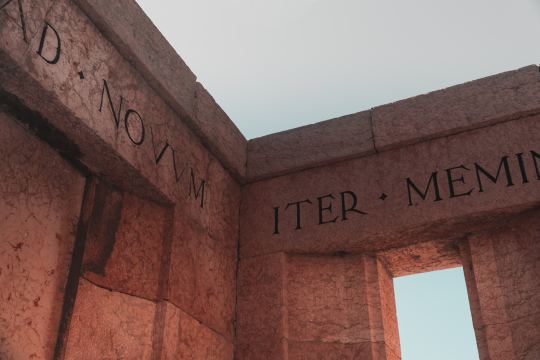
Here’s a non-exhaustive list of ways that English got vocabulary from Latin:
early Latin influence on the Germanic tribes: The Germanic tribes borrowed words from the Romans while still in continental Europe, before coming to England.
camp, wall, pit, street, mile, cheap, mint, wine, cheese, pillow, cup, linen, line, pepper, butter, onion, chalk, copper, dragon, peacock, pipe, bishop
Roman occupation of England: The Celts borrowed words from the Romans when the Romans invaded England, and the Anglo-Saxons later borrowed those Latin words from the Celts.
port, tower, -chester / -caster / -cester (place name suffix), mount
Christianization of the Anglo-Saxons: Roman missionaries to England converted the Anglo-Saxons to Christianity and brought Latin with them.
altar, angel, anthem, candle, disciple, litany, martyr, mass, noon, nun, offer, organ, palm, relic, rule, shrine, temple, tunic, cap, sock, purple, chest, mat, sack, school, master, fever, circle, talent
Norman Conquest: The Norman French invaded England in 1066 under William the Conqueror, making Norman French the language of the state. Many words were borrowed from French, which had evolved out of Latin.
noble, servant, messenger, feast, story, government, state, empire, royal, authority, tyrant, court, council, parliament, assembly, record, tax, subject, public, liberty, office, warden, peer, sir, madam, mistress, slave, religion, confession, prayer, lesson, novice, creator, saint, miracle, faith, temptation, charity, pity, obedience, justice, equity, judgment, plea, bill, panel, evidence, proof, sentence, award, fine, prison, punishment, plead, blame, arrest, judge, banish, property, arson, heir, defense, army, navy, peace, enemy, battle, combat, banner, havoc, fashion, robe, button, boots, luxury, blue, brown, jewel, crystal, taste, toast, cream, sugar, salad, lettuce, herb, mustard, cinnamon, nutmeg, roast, boil, stew, fry, curtain, couch, screen, lamp, blanket, dance, music, labor, fool, sculpture, beauty, color, image, tone, poet, romance, title, story, pen, chapter, medicine, pain, stomach, plague, poison
The Renaissance: The intense focus on writings from classical antiquity during the Renaissance led to the borrowing of numerous words directly from Latin.
atmosphere, disability, halo, agile, appropriate, expensive, external, habitual, impersonal, adapt, alienate, benefit, consolidate, disregard, erupt, exist, extinguish, harass, meditate
The Scientific Revolution: The need for new technical and scientific terms led to many neoclassical compounds formed from Classical Greek and Latin elements, or new uses of Latin prefixes.
automobile, transcontinental, transformer, prehistoric, preview, prequel, subtitle, deflate, component, data, experiment, formula, nucleus, ratio, structure
Not to mention most borrowings from other Romance languages, such as Spanish or Italian, which also evolved from Latin.
Further Reading: A history of the English language (Baugh & Cable)
160 notes
·
View notes
Text
Camellia: Copia x f!reader - Chapter 7
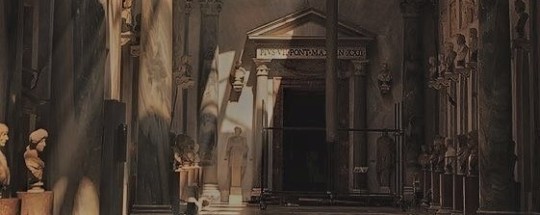
Camellia: n. - A flower which symbolizes a deep desire or longing.
Summary: You slowly chip away at Elizabeth's diary. Copia takes you for a little break to clear your head.
Word count: 4.4k
A/N: Hey hi hello!! Thank you once again for your incredible patience with these chapters. You all are so very close to my heart and I cherish every single like/reblog/comment (I cry when people say nice things to me, help). That said... let me know your thoughts!!
Warnings: possible mention of anxiety (very brief), Sister Imperator being shady, mentions of ritual sex (no graphic depictions)
AO3 / 1 / 2 / 3 / 4 / 5 / 6
You live in limbo for a full week. “A few hours” of working in Copia’s office had turned into a full day and well into the night. Then one day turned to two, and two to four, and then you found yourself in his office without him asking, simply because it would save time.
The atmosphere between you and Copia during these days is oddly comfortable. You’ve always preferred to work alone, feeling that any noise or talking would be a distraction. Your translations would always turn out more eloquent and faithful to the original text when you could place yourself into the author’s headspace, and that requires near silence or, at most, the ambience of the room around you.
With Copia, though, you find that you’re able to focus even when there is noise or talking in the corridor outside his office. Part of you wants to believe that it’s just the change of scenery. His office is opulent, as the rest of the Abbey, but understated. The wall to the left of the door is lined with bookshelves filled with books and little relics or knick knacks. The desk you work at, which sits nestled in the back corner of the room, had been piled with papers and books which you’d helped him organize (a task which he insists he owes you a favor for), but now it houses your own materials. His desk is still fairly cluttered but since you’ve started spending the days in his company, he’s made a significant dent in the work.
He’d said that having a study buddy helps him stay on task. You’ve always thought you were the opposite, but perhaps you’d never found the right person. It’s as if Copia radiates this aura of calm and focus that you can inhale by just sitting in the same room as him. Your notes are clearer, you can decode letters faster, the Latin flows from your pen smoother.
That’s not to say you always stay on task.
There have been times when a little observation or comment turns to an hour-long conversation, or an invitation to the refectory for lunch turns into a walk through the gardens to take advantage of the warming weather. Or a little glance his way turns into watching him work, memorizing the pattern of his pen’s dragging across a signature line. Watching the little cowlick he tries so desperately to keep in place as it falls back over his forehead. Spotting a tiny smudge in his black paints and remembering how his face had looked, soaked in rain and bare and flushed at your touch.
Yes, you have been living in limbo between being Copia’s study buddy and being something more.
You know, he’d said. You must.
You do know. If the past week has shown you anything, it’s that you know, more surely than you’d expected to, that you’re dangerously close to falling in love with him and that every day you tip further and further over that cliff. The abyss below is deep and if you fall you have no chance of climbing back out.
Copia… Copia is already plummeting. There’s a pleasant heaviness that settles in his chest at the thought of you, increased tenfold at the sight of you. Just existing in the same space as you makes him content with how his life has been, like every moment he’d spent alone only led him to you. Oh, yes, Copia is hurtling downwards at terminal velocity and it’s a long way down.
Somewhere within the last few minutes, Copia noticed you’ve stopped writing. Your eyes stare blankly at the letter grid, one hand pointing to keep track and the other holding your pen a few inches off the notebook page. You must be lost in thought.
“Tesoro?” Copia calls gently. A small smile plays on his lips. He’d gone for the informal paints today after staying in his office far too late to complete some work the previous night, and not at all because you’d accidentally let slip that you like his freckles during a particularly sunny walk. “Where did you go just then?”
At the sound of his voice, your eyes flick up towards where he sits at his desk, watching you. You blink. “Mars, I think,” you say with a little laugh. “I’m stuck on this one phrase.”
Copia rises from his desk chair, stretching his arms above his head, and you try not to stare at the little sliver of skin exposed when his shirt rides up. “Would you like another pair of eyes on it?” He asks.
“Here,” you nod, pointing at the line in your notebook where you’d written the deciphered phrase in Latin. “Collige virgo rosas. Literally, ‘pick, girl, the roses’.”
“Ah, so… what is that phrase? ‘Stop and smell the roses’, yes?”
“Yes, exactly,” you say. “But in the context of this, it doesn’t make sense. She’s not talking about something good.”
Copia’s brows furrow as he rounds your desk and comes to stand beside your chair. He leans over to read what you’ve deciphered in your notebook. The words of Latin slide effortlessly off his tongue as he reads your work out loud, and not for the first time, you’re reminded of how smart he really is. Not that you ever doubted it—he’s proven time and time again through answering your questions about the Ministry’s history that he’s Papa for a reason—but it’s a quiet intelligence. The two of you could be joking about something entirely inconsequential and then suddenly he’s telling you about the theistic anti-religious undertones of the works of Marcus Aurelius and somehow he makes the transition make sense.
“Oh! I see,” Copia says with a jaunty little snap of his fingers. “Here. Further down, read this part.”
Your eyes follow his gloved finger down the page of your notebook to a passage you don’t quite remember deciphering. Using the letter grid is mindless now. After spending a week doing nothing but mapping and mapping and mapping every single letter in Elizabeth’s diary, you’ve learned how to let your mind drift just enough that the translation is still accurate but your mind is elsewhere.
In horto moribundo, elige rosas sanas, Elizabeth had written.
In a dying garden, choose healthy roses.
You continue to read the rest of the passage, and yes, now that first idiom makes more sense. It’s oddly… optimistic, for Elizabeth.
“Huh,” you say dumbly, suddenly all too aware of how close Copia is standing. “I don’t remember writing that at all.”
“Because you were on Mars,” Copia laughs. “Come back down to Earth and we can go for a walk, si? You seem to be, eh… zoning out.”
You smile at him. His eyes are already on yours. From this close you remember that, on top of his intelligence and kindness and wit and charm and empathy, he’s devastatingly handsome. And then you remember how you feel about this man, and how this man feels about you, and your heart kicks up a gear. There haven’t been any romantic declarations or passionate kisses, but every time you pass the romance section of the Library on your way to return Elizabeth’s diary to its lockbox at the end of the night, you’re tempted to borrow a book or two, just for the catharsis of it.
Carefully, you close the diary and wrap it in its linen to protect it while you’re away. Copia moves back to his desk and fishes his key out of the top drawer. “Let’s go to the front gardens today, cara mia,” he says.
“How come?” You ask as he opens his office door for you.
He shrugs. “It’s something different. And the sun is over there right now.”
He doesn’t mention the conversation he’d had with Terzo the night before. How he’d approached his brother, the master of romantic gestures and wooing, and asked how exactly he might tell someone he has feelings for them in a way that won’t leave anything in question. He doesn’t mention how Terzo had (embarrassingly) made him roleplay how his confession might go. He also doesn’t mention that, at Terzo’s suggestion, he’d gone to Primo to ask where the prettiest places in the Abbey gardens are, and Primo had told him that the front gardens are full of Japanese camellia bushes on their last leg of blooming for the Spring season. Copia doesn’t mention how, after that, Primo had lent him a well-loved copy of Linguaggio dei Fiori.
When you’re finished organizing your materials, Copia leads you out his office door with a warm hand placed on the small of your back. The touch, little as it is, makes you shiver.
“I haven’t been to this side of the Abbey,” you tell him. “Not since I arrived.”
Copia watches you as you speak. “The front of the Abbey is very, eh, overlooked. Most people prefer the back gardens because they are bigger. There is more to look at.”
He seems nervous, you notice. You can hear the creaking of his leather gloves as he wrings his hands behind his back. And despite his calm facade, his voice sounds… different. Not weaker, but less sure.
“Copia,” you say quietly. You always say his name with such softness and it makes his heart pound. “Are you alright?”
He smiles at you but it isn’t very believable. “Oh, yes, tesoro, I’m alright,” he says too quickly.
You tilt your head.
“Well…”
You can read him like a book, he knows. Fitting—you can read almost any book in the Abbey’s library, no matter the language, and you choose to read him. And he can read you, too. Like scholars with their manuscripts. Cheesy, he thinks. I���ve been talking to Terzo too much.
“It’s alright,” you say after a pause. “We can just walk, if you’d like. But you have my ear if you need it, or if you need some time—”
“No, no, I…” Copia gently takes your hand as if you’d drift off if he didn’t. “Please, walk with me. There are just… things on my mind, which I need to sort out.”
You squeeze his hand, relieved. “Okay. I’m with you.”
Sathanas. You’re with him. Copia breathes in and out again, shakily. You’re with him, it’s just you. Nothing to be nervous about.
It’s just… you.
You, who he’s about to bare his soul to. You who came into his life and who will stay for such a short time. All he has is a few months with you, and he’s been kicking himself for a week, trying to tell you that he can’t bear to waste any more time, not when you’re both well aware of the feelings you each hold. He can’t go another hour without knowing how it feels for you to know. He knows you know, of course, but you don’t know—
The hallway seems too long. Copia’s working himself into a spiral. His brain keeps telling him you’re as good as gone already. That if he tells you how he feels, you’ll reject him and he’ll lose you. But he’s going to lose you anyway, and he needs to know if he can have these few months with you or no time at all.
Two roads diverged in a yellow wood, he thinks. And sorry I could not travel both…
The two of you come to the front door of the Abbey. The old wood creaks when you push it open with your free hand, your other still holding Copia’s. You emerge outside and you hold the door open for him to follow after you. He gives you a small smile, not entirely present. Perhaps on Mars, visiting where you’d been.
The front of the Abbey is picturesque. You remember seeing it as you rode up the driveway that first afternoon. It had been so imposing then, gothic and ancient and huge compared to Marseille. These things are still true as you emerge into the sunny lawn, but in the sunbeams, with a breeze that holds only a little bit of bite compared to the air when you arrived, it begins to feel safe.
Your mind reels against the Abbey being a safe place. For your entire stay thus far, you’ve been trying to convince yourself that you don’t like it here, that you aren’t absolutely titillated by Elizabeth’s diary, that the massive Library doesn’t make your mouth water. This is just a temporary work placement, nothing more. Nothing can keep you attached. Not even Copia.
You almost have to laugh, because you know immediately that you’re lying to yourself. You’re already attached. The thought of leaving the Abbey burns in your gut, but the thought of leaving him almost makes you crumble.
You squeeze Copia’s hand. “Still with us?” You ask gently.
Your voice brings him back to this realm, but he’s already mostly through his mental recital of The Road Not Taken, and it’s better if he finishes it. It helps him breathe. Decide.
Two roads diverged in a wood, and I— I took the one less traveled by, And that has made all the difference.
“Yes,” Copia replies after a moment. “Still here. Sorry, cara mia.”
You shake your head. “Don’t be. Would it help to talk out loud?”
Copia turns his head and looks at you. All the words he’d practiced with Terzo are suddenly lost to him, nowhere to be found in his brain. Now he just sees you, feels your presence in his chest, and he knows he can’t use some rehearsed line with you. That’s not him. And more importantly, that’s not you.
The two of you walk along the blooming camellia bushes. You recognize them from the first time you’d walked in the back gardens with Copia. They’re the only flowers in bloom at this time of year, bright white and pale pink on a backdrop of evergreen. You wonder why more Siblings don’t spend time in the front gardens, especially at this time of year. The flowers are big and supple, if not just on the verge of wilting for the season, and the springtime breeze carries their sweet scent on a hint of warmth to come.
“Tesoro,” Copia begins, his voice soft and quiet, just for you. “I, eh… well, I wanted to… tell you that I, eh…”
You wait patiently. Your heart kicks and you think you might know what he’s trying to say, but you give him time. Neither of you have spoken the words out loud, and in your head, it exists only as the thing between you. The thing that is happening, the thing you feel.
Instead, Copia turns the subject. “I read about camellia flowers recently, you know,” he tells you. “Primo leant me his book, Linguaggio dei Fiori, the language of flowers—well, eh, you must already know that, of course, you are fluent…. Anyways, I was reading about camellia, and I learned that this kind is native to Japan, isn’t that interesting? They only bloom in late winter or early spring, and go dormant in the summer, but they don’t die because they are evergreen shrubs, which means—”
“Copia,” you interrupt gently, “breathe.”
“Right, yes…” He takes a deep breath and his shoulders drop. “What I mean to say is that these flowers will be gone soon, when the warm weather comes. I wanted to take you to see them before they were dormant.”
You stroll along the line of camellia bushes, observing the large blooms closely. The sun almost makes them glow against the dark green leaves. There are a few early bees gathering pollen for their stores, until it’s time for the summer flowers to blossom. You reach out to brush your fingertips against the outer petals of one pink flower, feeling the satiny texture and the dewdrops still clinging from the morning. “They’re beautiful,” you say softly.
“They remind me of you,” Copia replies.
Oh sweet Satan, you think, your heart suddenly pounding in your ears.
He continues after a brief pause. “In that book, Linguaggio dei Fiori, it said…” he clears his throat. “It said that camellia symbolize admiration and affection and desire.”
You look at him then, and he meets your gaze. Admiration and affection and desire.
“And longing, for someone who is far away.”
Copia steps closer to you. He gives your hand a gentle squeeze, as if to tell you that it’s alright, he won’t ambush you, that these are those feelings and now he’s saying them out loud. Your eyes stay locked on his own, watching as his green eye grows more vibrant against the backdrop of the camellia bushes’ leaves. His other hand lightly runs down your arm to take yours.
“I’m not far away,” you whisper.
“No, you are not,” Copia says, and he’s close enough that his breath wisps over your face. You have to tilt your head up slightly to hold his gaze as you stand nearly chest-to-chest. “You are here, and the camellia are getting ready to close their flowers.”
“And when I go, they will bloom again.”
“Yes. And when they do, I will long for you, Camellina.”
Camellina. Little camellia. His flower, his blossom in the cold. Here until you’re not. “Copia…”
He reaches up and brushes a stray hair from your forehead, then traces his fingers down your cheek until he cups your jaw tenderly. “I don’t want to keep dancing around each other,” he tells you softly. “If we only have so much time, I don’t want to waste it.”
Your eyes flick back and forth between his own, and you’ve committed your own cardinal sin. You’ve gotten attached. So very attached. Incredibly, deeply attached, and you’re terrified, but Lucifer below, how can you be scared when he’s looking at you like that. Like he might already love you.
“No,” you say. “I don’t want to waste it, either.
“Then please, camellia mia, let me kiss you.”
He waits for just the slightest nod of your head before he draws you in and presses his lips to yours.
It’s really not a kiss at first, just a light brushing of lips together. He wants to know you’re sure that this is what you want. And when you don’t run, or disappear, or turn into a frog like some fairytale bastardization, he kisses you for real. Your lips fit together like they were cast from the same mold, built as the perfect opposite by Satan himself. He kisses you like you’re ethereal.
His hand on your jaw pulls you closer while his other hand slides around your back, and your own find his shoulders to keep yourself upright. He tastes like overly sweet coffee and whatever the refectory had served for breakfast and something else you can’t really place, but has the same distinctness as how he smells. The subtle oakiness of his cologne fills your nose as it sweetly bumps against his. His thumb gently pushes your jaw up, tilting your head to kiss you deeper at a better angle. You feel his tongue swipe along your bottom lip and you don’t even have to think before you let him in.
Your hands trail down from his shoulders to his chest and you press slightly, feeling the warmth of his body under his vest. You can feel the quick pounding of his heartbeat beneath your fingertips and you know from the thundering in your ears that yours is paced the same.
When he pulls away, it’s barely far enough to stop the embrace. With every slight movement, your lips brush together in the lightest touch possible, an echo of the kiss you’d just shared.
“Impie… seigneur des ténèbres en bas,” you breathe against his lips. It seems the only words that can escape you now are those thanking your Dark Lord for the man standing before you. What else can you say when Copia has just drained your brain of any coherent thought? “Embrasse-moi comme ça pour toujours.”
Copia laughs, the puff of air brushing against your lips and cheek. “I’ve broken her, I think,” he says. “She’s lost her English.”
You swallow and try to suppress the heat rising to your face. “I, uh… merde, I can hardly think. Maybe you did.”
“Is this a good thing, camellina?” Copia asks, his thumb brushing against your cheek. He’s still wearing his leather gloves but you wish that he’d take them off. You want to feel his palms against you.
“Oui—sì, er… yes,” you stumble.
Copia laughs again and presses another kiss to the apple of your cheek. “You know, I thought I was going to be the one tongue-tied,” he says with a little smirk. “But I’ve rehearsed this in my head about a million times, so perhaps the shock hasn’t set in yet.”
“Oh? It hasn’t?” You ask, finally coming back to your head. You lean up and kiss him again, simply because you can.
“N-no, not yet. Sathanas, do that again.”
You oblige, and kiss him once more. This time you linger, your fingers gripping the fabric of his vest and pulling slightly. You feel him smile into the kiss. He’s still smiling when you pull away. “I don’t think you ever finished your thought,” you say, remembering what he’d said before… all this.
“No, I did,” Copia tells you. “I had this whole speech planned, telling you how much I adore you, but I kind of… stumbled through it.”
You smile, imagining what his rehearsed speech might’ve been like, but it doesn’t feel right. You can’t imagine it going any other way than it did. “I adore you, too,” you say softly. “And your speech was perfect. Very you.”
“Awkward, long-winded, but somehow made sense?” Copia asks. He draws you into his side and takes your hand again, resuming your stroll through the front garden.
You laugh, and Lucifer below, it’s the sweetest thing Copia’s ever heard. “Exactly.”
Oh, this is bad. Maybe you would’ve gotten away with a mild heartbreak when you left if you hadn’t kissed him. But you had, and you know that when you leave you’ll be devastated. Kissing him, allowing yourself to finally feel the feelings you’ve been desperately pushing down since you first met him, is just digging yourself deeper into the hole you find yourself in.
But how comfortable and warm and perfect this hole is.
You remember the passage from Elizabeth’s diary you’d been having trouble with. In a dying garden, choose healthy roses. Find the good within the bad, the light in the dark.
When you spare a glance at Copia as the two of you continue strolling through the front gardens, you find that there’s a dimple on his cheek that hadn’t been there before, and little crinkles beside his eyes. He’s smiling. You smile too, and look forward again.
Pick, girl, the roses.
~~~
“You remember what we talked about, I’m sure?” Sister Imperator asks Secondo, who stands in her office rather against his will.
“Yes.”
“And you have kept it a secret?”
“Yes.”
He hasn’t.
No, in fact, he’d done the opposite of what Sister Imperator had asked him to do, just to slight her. He’d told you exactly how old Elizabeth’s diary is, and what he knows about Prime Movers. Although it seems like Sister Imperator knows more than he, if she’s so adamant about keeping it hidden.
“Good,” Sister nods. “We wouldn’t want some little French girl getting any ideas.”
Secondo huffs and looks out the window of Sister Imperator’s office.
There you are, walking hand-in-hand with his younger brother, looking quite cozy. From the second-floor vantage point, Secondo can tell the two of you are talking, but he can’t tell about what. The window is situated at Imperator’s back—she’d given herself the corner office, of course—so she can’t see what’s happening just under her nose. Secondo’s lips quirk up at the corner at the sight. From the little interaction he’s had with you, he knows you’re not some naive little French girl.
“Sister,” Secondo begins, “I do not understand what is so important about it that it has to stay a secret.”
Sister Imperator is irked. “Because it must,” she says, as if that’s a good explanation. “We can’t have just any Sibling with a womb vying for Papa’s attention because they heard a silly rumor. Not everything is full of sunshine and butterflies.”
“And what rumor is that?”
Sister sighs. “Being a Prime Mover is not glamorous, Secondo. The role is barbaric and dehumanizing, and I would not have any Siblings think otherwise.”
Secondo turns to leave with a huff. “I was hoping you would tell me something I did not already know.”
“Ask your father,” Sister Imperator says, and perches her reading glasses on the tip of her nose in dismissal.
~~~
March 29
I woke up in Papa’s bed this morning, alone. I do not fool myself when I say I had not hoped differently.
Mother says the ritual went well. She says the candelabras in the garden chapel stayed burning all night, a sign of approval from the Dark One. She says that candles lit from the fire of burning ritual bedsheets will burn until the sun takes over, but I think it is just because the candles were large and extra care was taken to ensure the chapel is not drafty.
He was very gentle. He was very… skilled with his hands and mouth. He treated me like a lover when we were alone in the chapel. It was as if the ritual bed was my own, and all I could focus on was how I felt and how he felt. Whispered words and praises and caresses on my skin. He was human for those moments. He became Papa once more when the knocker sounded.
Mother said to be glad that he was gentle at all. She said, ‘pick, girl, the roses.’
I want to believe that Papa hates this as much as I. He seems kind. Perhaps a man obligated by faith into such a demeaning practice, but kind nonetheless. I want to believe he cares for me in some regard. If not now, I hope he will grow to, as we will be spending much time together. But he was kind, and he was gentle. In a dying garden, choose healthy roses.
~~~~~~~~~~~~~~~~~~~~~~~~~~~~~~~~~~~~~~~~~~~~~~~~~~~~~
Tag list: @bonelessghoul @gbatesx @the-did-i-ask @leah-halliwell92 @archive-obsess @rosacrose @nikkyatoyourservice @sodoswitchimage @portaltothevoid @lightbluuestars @thesoundresoundsecho @stephnthangss @enchantedbunny @jackson5611-blog @copiasprincipessa @kadedoesthings @justheretoreadleavemealone @tiedyedghoulette @bl00d-mxxn @honimello @deetz-ghuleh @copias-sewer-rat
#the band ghost#ghost band#ghost#ghost bc#papa emeritus x reader#papa emeritus x f!reader#papa emeritus#papa emeritus iv#papa emeritus iv x reader#papa emeritus iv x f!reader#copia x reader#copia x f!reader#copia#popia#popia x reader#popia x f!reader#ghost bc x reader#cardinal copia x reader#cardinal copia x f!reader#secondo#papa secondo#papa emeritus ii#sister imperator#copia emeritus
114 notes
·
View notes
Text
Greek God Thoughts: The Heart of the West (4/?)
One of the things that has always honestly, genuinely troubled me about the Percy Jackson series is the idea of the Heart of the West.
It's not the idea itself - Western Civilization which views itself as the direct inheritor of Ancient Greek and Roman culture is something which very much exists and which has been a very powerful motivator of empires for millennia. The Russian Empire, for instance, called itself The Third Rome, to say nothing of the innumerable lives lost trying to replicate the actions of Alexander the Great.
No, my problem is the fact that it moves.
Or, rather, that the timing and placement of these moves as hinted at in canon makes no sense. There's no earthly way anyone would have called the United States the Heart of the West during the 1860s, yet the Roman/Greek distrust is supposed to be a driving force behind the war and the the impetus for the two groups to be separated. And how would all of this worked when they were shunting around between countries in Europe anyway? Would the actual Mount Olympus serve as a backdoor to Olympus itself?
So this is my attempt to make sense of the movement of The Heart of the West as far as PJO is concerned.
Ancient Greece
Obviously the first Heart of the West is Ancient Greece, given we're talking about Greek Gods and Ancient Greek culture. This would have begun with the Gods and continued at least until the conquest of Greece by Phillip of Macedon in 338 BCE - Mount Olympus formed the border between Thessaly and Macedon in antiquity after all - and probably continued well into the Roman Republic. Olympus remains at Mount Olympus so long that the idea it might ever move should seem absurd - and, when all things are taken into account, have been the home of the Gods for as long as all the other put together.
Ancient Rome
But how do we account for Ancient Rome? It came onto the scene in 753 BCE, before even the Pentecontaetia, and adopted much of the Greek Gods and culture as their own.
I argue that the Gods remained primarily Greek until the Battle of Cynoscephalae in 197 BCE. After that, they are predominately thought of and act as their Roman forms, with the main entrance to Olympus moving to somewhere on the Capitoline Hill. There's still a "bridge" or "backdoor" to the original Mount Olympus, but it's like an old rope bridge over a deep ravine - sure, you can use it, but most won't risk it. The change from Greek to Roman should seem near complete to outside observers, and might have been if not for later events.
Constantinople
The Heart of the West remains in Rome until 330 CE, when Constantine moves the capitol of the Empire to Constantinople. This begins as a very Greek city which is quickly and drastically Romanized, but over time returns to its largely Greek roots. (That is, for all the western Roman empire became Latinized, the eastern, Byzantine part largely remained Hellenized.) A lot of the palace coups the empire is famous for can be framed as the Gods' Greek and Roman aspects at war.
It was not a good time for demigods, with both CJ and CHB existing in a near-constant state of civil war.
All of this continues until the Fourth Crusade, when Latin Christians besiege, sack, and eventually conquer the city in 1204. Just as the people, books, treasures, and relics carried westward were said to fuel the future Renaissance, the crusaders also carried back the Heart of the West. But where to?
Holy Roman Empire & France
I argue that after the Fourth Crusades, the Heart of the West went first to the Holy Roman Empire - which did after all claim continuity with Rome - and France - which was culturally dominate even when it was not politically or militarily. Perhaps it started in one and moved to the other, or bounced between locations depending on the generation, or had two sets of main entrances to Olympus for most of this period.
The exact details here are where I'm most fuzzy. All I can tell you is that the Heart of the West would have left France with the death of Louis XIV in 1715. Or perhaps it was a lingering death, ending no later than the 1759 Battle of the Plains of Abraham. Regardless of the details, it is certainly gone by the time the French Revolution gets underway.
British Empire
Given how its inhabitants viewed themselves as the natural, direct inheritors of all the best parts of western culture, it makes sense that Olympus would move to London during the height of the British Empire. It's vast merchant marine and impressive navy far outstripped anything else of the time, which reads as very Greek to me in a way that Napoleon, for all he was trying to echo parts of the Roman Empire, never quite managed. (It is a headcanon of mine that Horatio Nelson was the last great son of Poseidon before Percy. Hell, perhaps Napoleon was a son of Zeus and the Napoleonic Wars were just another Big Three kids fight as far as PJO is concerned.)
But for all canon's talk of Washington being a son of Athena and the American Civil War being a clash between Greek and Roman camps, the Heart of the West remains in the British Empire until the Second World War. There are a variety of reasons for this, not the least because I envision the concept of Heart of the West as an intersection of cultural hegemony, military strength, and economic vitality that, while not quite aligning with the modern idea of superpowers, certainly has some overlap.
For all the American Frontier Wars succeeded in asserting US military and cultural dominance on a regional basis, compared to the cultural, linguistic, legal, and historical legacy of the British Empire at the same time, it is impossible to argue the fledgling United States had the same. (It was, in fact, one of those cultural, linguistic, legal, and historical legacies.) It would take until the Spanish-American War for the United States to start approaching the same level of influence... and the Second World War itself for the British Empire to start declining enough for the Heart of the West to take up residence elsewhere.
United States
And so there we have it - the Heart of the West could not take up residence in the United State any earlier than 1944. (If one wants to be particularly pedantic, unless the entrance to Olympus moves within an area after it gets settled, it couldn't arrive in NYC any earlier than 1931, when the Empire State Building was finished.) I imagine this was a quick wartime move for the Olympians and their children, happening virtually overnight compared to some of the other power shifts, and that this is reflected in the camps. Particularly CHB.
After all, if the Second World War was supposed to have been caused by children of the Big Three, there would have had to be multiple adult children of the oldest gods for this to happen. If those children spent any time at CHB at all, the Greek camp would have had to have had more than just a few small cabins for only the children of the Olympian gods - it's just a matter of logistics. You'd need bigger cabins - and presumably ones with multiple rooms so that the adults aren't bunking in the same room as the little kids.
The CHB we see in PJO is therefore the result of this quick wartime move - the handful of kids too young to be involved in the war throw something together quick that will get them by until the war's over and things go back to normal. But because of the Oath things never go back to normal: most of the adult demigods died in the war, and there aren't any new children of Zeus or Poseidon. Demigods start dying younger because the adult siblings that would have trained them just aren't there, and the ones that remain never know camp was any different. CJ, not having been as involved in the war, is set up along its usual lines on the opposite coast.
But what about the Civil War?
The Civil War - and, indeed, all the other places mentioned as the Heart of the West without it making sense to have been such - can be put down to the fact that the Greek Gods do not stay in Greece. The whole idea of the Heart of the West is one wherein Western culture spreads outwards from a culturally dominate center.
The Civil War? One could argue that Ceres would have been drawn to the plantations in the American South, as they'd bear some resemblance to the plantation farms of the Roman Empire. Hephaestus might have been drawn to the industrialization happening in New England and Athena, ever the flashpoint, would certainly have had a hand in a fledgling democracy. Shake and you get a destructive war that draws in allied demigods without the Heart of the West ever twitching in London.
The Heart of the West is mentioned as having been in Spain or Portugal? Perhaps some gods took more interest in these parts of the world than wherever Olympus happened to be at the time - Poseidon probably had a huge hand in the Age of Exploration, and wars anywhere in the world might have drawn Ares' or Mars' attention - but their presence was never enough to cause a wholesale shift. Perhaps these places could have become the Heart of the West but never succeeded in displacing wherever held it at the time; their influence was felt to greater and lesser degrees by the campers as a whole, but Olympus never moved.
TL;DR?
As much as I love PJO and should not expect a children's fantasy series to have a self-consistent backstory which makes sense when viewed in light of certain historical realities... I do. I've tried to logically make sense of The Heart of the West and the various locations which Olympus might conceivably be thought to dwell in light of actual history, but am far from an expert in the subject.
That being said, I stand by the Heart of the West having been:
Greece / Mount Olympus (??? - 197 BCE)
Roman Empire / Rome (197 BCE - 330 CE)
Eastern Roman Empire / Constantinople (330 CE - 1204)
Holy Roman Empire / Vienna (1204 - ???)
France / Paris (??? - 1715/1759)
British Empire / London (1715/1759 - 1944)
United States / New York City (1944 - ???)
GGT: 0,1,2,3
#pjo#hoo#toa#ggt#percy jackon and the olympians#heros of olympus#trials of apollo#mount olympus#greek gods#rants#camp jupiter#camp half blood#western civilization#western culture#rick riordan#riordanverse#riordan universe#meta#making sense of things
31 notes
·
View notes
Text

ㅤㅤㅤㅤㅤㅤㅤㅤㅤㅤ𝐓𝐇𝐄 𝐌𝐀𝐑𝐊 𝐎𝐅 𝐇𝐄𝐂𝐀𝐓𝐄
ㅤㅤㅤㅤㅤㅤㅤㅤㅤㅤㅤㅤ𝐢. 𝐓𝐇𝐄 𝐓𝐇𝐑𝐄𝐄 𝐇𝐄𝐀𝐃𝐄𝐃 𝐁𝐄𝐀𝐒𝐓
read the prologue ! story intro ! — sam and dean's search for answers to break the bond are thwarted by a call from Missouri. Another premonition like the one that lead them to you, another hunt. — warnings!! hunt-level violence, guns, etc. strong language. spooky scenery. 4.9k words

The library was a relic of another time, draped in dust and quiet resignation. Shadows pooled in the high corners, untouched by the weak fluorescent lights overhead, their uneven hum adding a ghostly edge to the stillness. The air was heavy and stale, carrying the faint, damp tang of mold that clung to the yellowed pages of forgotten books. Dust motes floated in slow, aimless patterns, disturbed only when the long, battered table received another soft thud of a tome. Its surface, marred by graffiti and deep scratches, bore the marks of restless patrons and years of neglect.
From your sagging armchair near a window in the corner—a relic as weary as the library itself—you observed the brothers. The chair groaned beneath you with every shift, its springs wheezing in protest like a creature disturbed from sleep. Dean sat at the scarred table, hunched over a pile of open books, his expression dark with frustration. The sharp, irritated rustle of his turning pages cut through the thick quiet.
Sam moved with quiet determination, his tall silhouette weaving between the densely packed shelves, disappearing into their shadowed depths and reappearing moments later with another precarious stack of books. The subtle rhythm of their movements filled the room with a sense of purpose, a stark contrast to the library’s forgotten stillness.
Your fingers absentmindedly combed through your hair, a futile gesture to calm your own simmering frustration. It radiated off you in waves, thick and tangible in the air. Dean felt it—he didn’t have to say a word. His gaze snapped to you each time you sighed too long or shifted in the noisy chair, his eyes sharp with unspoken reproach.
If Sam noticed the tension swimming in the dust between you, he gave no sign. He buried himself in his work, his focus unwavering. Books piled around him, covering every inch between him and his brother. Their cracked spines and faded titles were the only defense against the weight of whatever they were searching for. His eyes flickered between one volume cradled in his forearm and another spread open before him, the faint scratch of his pen breaking the heavy silence as he scribbled notes.
“Hey, uh, this one’s about something called an Ailouros,” Sam murmured, his voice soft as that slight midwestern twang wrapped itself around the foreign word. He didn’t look up, his attention fixed on the page. “It says it’s a cat familiar—is this about you?”
“Ai-louros,” you corrected smoothly, the syllables rolling off your tongue with the lilting cadence of a language long buried under the sands of time. Your voice carried the faintest echo of your native tongue, a relic of a life lost to centuries of adapting, shifting, and bending to the weight of new dialects.
Sam blinked, his cheeks tinged with embarrassment as he mumbled, “Right, sorry. I took Latin instead of Ancient Greek in college—”
“What’s it say?” Dean cut in, his impatience slicing through the air.
Sam’s gaze snapped to his brother, the irritation in his expression barely concealed. He lingered there for a moment, his mouth opening as if to argue, but instead, he gave a resigned huff. His eyes flicked toward you, uncertainty flashing across his face before he lowered them back to the book in his hands.
“It says Ailouros was human once,” Sam began, his voice careful, his words feeling heavier with each passing moment. “Before Hecate turned her into a cat. She was… a love witch.”
Dean’s scoff was low, incredulous. “A love witch?”
“Punished,” you interjected before Sam could respond, your voice as steady and cold as the dark wood of the table beneath his hands. Your gaze meandering from the open window to the boys as they gave opposing looks of curiosity and mild disgust, “For her deviant use of magic. Condemned to serve as Hecate’s companion for eternity, so the biggest witch of them all could harness that love witch’s abilities for herself.”
The myth was short, a measly little testament of the reason for your existence. You’d once read it over, and over again when myths became prose. A life, a sacrifice—all wrapped up into two paragraphs in forgotten text.
Sam shifted uneasily, his grip tightening on the book as the weight of your words hung in stale air. Dean’s gaze narrowed, flicking to you with a mix of curiosity and irritation. “So, what? You’re her glorified magic lap cat?” His hands wave about as he speaks, and beneath the rough tone you catch the faintest hint of sincerity in his question.
Your lips curl into a small grin, but there was no humor in it, only a quiet, simmering defiance. “Something like that,” you murmured, tossing your head back against the chair, your focus back on the view of the dreary parking lot, the setting sun a deep blue backdrop to Dean’s impala.
“Alright, well, it doesn’t say anything about the magic of the bond or how to break it.” Sam exhaled heavily, closing the leather-bound tome with a soft thud. His shoulders slumped under the weight of the unsolved mystery, his gaze flicking toward you. “Is there anything you can give us to go off of?”
“We could kill her,” Dean interjects, his tone casual, the way one might suggest grabbing a burger.
Sam’s head snapped toward him, disbelief etched across his face. “What?”
The older brother shrugged, leaning back in his chair like it was the most logical suggestion in the world. “Don’t look at me like that, Sammy. She dies, and poof—no more magical lady-cat bond. Problem solved.”
A dry laugh escaped your lips, the sound devoid of any real humor. “Sure, we’ll just ignore the tiny detail of immortality being stitched into my bones.”
Your eyes slip back to the brothers, a quiet stare down in hushed argument ensuing between the two as you continue, “I could write you a list of all the ways I’ve been killed in the last thirteen centuries if you’re really committed to the idea. Maybe you’ll finally be the one to make it stick.”
Dean tilted his head, his green eyes narrowing with a challenge, the smile on his lips taunting and crass. “I mean, I wouldn’t be opposed to notes.”
“Dean!” Sam’s voice cut through the tension like a whip, his exasperation palpable. You’re not sure if it’s the bickering or the lack of progress in their studies that have him on edge, but it’s certainly bubbling at the surface. “No—Dean, enough.” he ran a hand over his face before turning back to you. “Ailouros—”
“Don’t call me that,” you snapped, the name landing like a stone in the quiet space between you.
“Fine. Whatever you want to be called,” Sam relented, his voice calmer but no less insistent. “Just listen—both of you.” His gaze moved between you and Dean, commanding attention with his tired eyes. “No one is dying. We’ll find another way.”
The library fell into silence once again, the heat between you and Dean giving way to Sam’s demands. Though, while the younger one buried his furrowed brows in another weathered book, Dean hardly kept his focus on the task at hand. If he wasn’t watching you with a look somewhere between agitation and utter confusion, he was mindlessly flipping pages while tapping along to his humming.
He looked entirely relieved at the faint sound of Sam’s phone buzzing in the pocket of his jeans.
“Missouri?”
On the other end, a voice spilled out in frantic, disjointed bursts. Your heightened senses diped into the conversation with ease, the woman he called Missouri stumbled over her words in a panicked rush. “Sam? It’s happening again—another one. Another witch. I saw it. It’s going to happen tonight.”
Sam stiffened, his jaw tightening as he processed her words. “Hey, hey—slow down. What did you see?”
“A witch, Sam,” she sighed, her voice cracking under the weight of the premonition. “She’s going to die, and if you three don’t move, it’ll be too late.”
Your interest piqued at the woman’s distress. Your witch was nothing more than ash in a fire pit, but you knew all too well of the slippery tricks of divinity.
Whatever was happening, it most assuredly was Hecate’s doing.
Sam murmured a quick assurance before hanging up, his expression grim as he looked between you and Dean. “Missouri had a vision. Another witch is going to be murdered tonight.”
Dean was already grabbing his jacket, his expression hardening into that determined, no-nonsense mask you were starting to recognize all too well. “Then let’s go.”
You stood, smoothing the fabric of your jacket as you prepared to follow. The weight of Missouri’s words hung over you like a storm cloud, a reminder of just how high the stakes of this unseemly bond had become.
The cool evening air greets you like a sharp inhale, crisp and biting against the adrenaline still thrumming in your veins. The gravel crunches beneath hurried boots as you follow the brothers, your gaze bouncing between their purposeful strides. The Impala looms ahead, dark and hulking, as if bracing itself for another wild ride. It isn’t until Dean revs the engine and peels out of the drive that you lean forward, clearing your throat to break the tense silence.
“I suppose this might be worth mentioning,” you start, your tone deliberately casual as the car rockets down the winding backroads. “You may have killed my Hecate, but she—technically—isn’t dead.”
The words barely leave your mouth before the Impala swerves violently, tires screeching as Dean jerks the wheel. Both brothers whip their heads toward you, twin masks of disbelief and alarm painted on their faces. Dean’s voice is sharp enough to cut glass.
“What did you just say?”
“My gods, do you always need to hear things twice?” you grumble, the spike in his tone scraping your nerves raw. Irritation simmers just beneath your skin, your nails digging into the worn leather of the backseat.
Dean’s jaw clenches, and Sam, ever the mediator, jumps in, his voice more measured but no less tense. “What do you mean she isn’t dead?”
You resist the urge to roll your eyes. “I mean, she’s a literal fucking goddess. Did you really think she’d put all her eggs in one basket? That she wouldn’t have, oh, I don’t know, backup plans for situations like—let’s say—being murdered?”
Dean growls something low under his breath and slams his foot harder onto the gas. The Impala groans in protest as you’re thrown against the backrest, the engine roaring as the scenery blurs past in dark, shadowy streaks. His shoulders are wound tight, tension radiating off him like heat from a wildfire.
From the passenger seat, Sam shifts awkwardly, yanking a weathered leather journal from beneath a stack of maps and flipping through its brittle pages with urgent fingers. “Alright,” he mutters, his tone clipped and nervous, “maybe we should call Bobby or something. Dad doesn’t have anything in his notes about handling this.”
Dean exhales sharply, his knuckles whitening against the steering wheel. “No—I mean, yeah,” he grumbles, his frustration barely restrained, “but first, we need to figure out what the hell is going on with Missouri’s vision.”
Sam sighs, rubbing his eyes with a roughness as if he can physically push the tension away. “Right. You’re right.” He tosses the journal onto the seat, its weight landing with a muted thud, before turning his attention back to the crumpled map in his lap.
“You sure Missouri gave us the right coordinates?” Dean gruffs, his voice taut, a frustrated edge threading through his words.
Sam glances up from the map, his forehead creased in thought. “She seemed sure enough, but—”
“But nothing,” Dean snaps, his eyes narrowing against the dark road ahead. “If Hecate’s not as dead as we thought, and we’re running blind here, I don’t want to walk into a trap.”
The Impala hurtles deeper into the night, its rumble echoing like a war drum in the heavy silence. From the backseat, you watch their agitation swirl in the cramped space, a storm brewing on the horizon of their nerves. The faint scent of leather and gun oil mixes with the cool night air as you settle back into your seat, bracing yourself for whatever chaos comes next.
Sam breaks the silence without looking up, his voice a mix of irritation and focus, “The turn should be coming up. Just keep driving.”
He clicked on a flashlight, popping it between his teeth as he used both hands to manage the map. He scans it for a second under the soft light.
“You know,” you said idly, your voice cutting through the low hum of the engine, “this whole sneaking-around-in-the-dark thing makes a lot more sense if you actually know where you’re going.”
Dean glanced at you in the rearview mirror, one eyebrow arching in annoyance. “If you’re gonna critique the operation, maybe you could lend a hand instead of being a backseat commentator.”
You smirked, your eyes still fixed on the passing trees. “I’m just saying, if the point of all this is to stop someone from dying, the scenic route isn’t exactly helping.”
Sam sighed, lifting the map higher to block out both of you. “We’re close,” he muttered, more to himself than anyone else.
A few minutes later, Sam pointed toward a turnoff, and Dean steered the Impala down a narrow gravel path. The headlights illuminated the overgrown edges of a driveway that seemed to vanish into darkness. Finally, the car rolled to a stop in front of a crumbling Victorian house, its crooked silhouette looming against the storm-heavy sky.
The three of you stepped out of the car, the cold air wrapping around you like a shroud. The house looked like it had been plucked from a nightmare—its windows gaping like hollow eyes, the front door whipping against it’s frame, a wicked thudding sound cutting through the night.
Sam, having ruffled through the trunk's arsenal, slams it back down, “This should be it.”
Dean adjusted his jacket, his other hand resting on the hilt of his gun. “Great. Creepy house in the middle of nowhere. Classic.”
You stepped forward, arms crossed, your gaze sweeping over the property with the kind of detached calm that unnerved them both. You tilted your head, fixed on the energy emitting from the house, “There’s a ghost in there. And a witch.”
Dean turned to you, his brow furrowing. “What? How do you know that?”
You shrugged, tucking your hands into your pockets. “I just do.”
Sam looked between you and the house, his frown deepening. “Wait—what do you mean, you just know? Are you sensing them or something?”
“Something like that. I recognize the change in frequency, the way the world around us reacts to things like ghosts and witches.” You glanced back at them, your cool expression rivaling their shared bewilderment. “These are things not of this earth, it’s gonna disrupt the natural energy around it—can you stop looking at me like that?” You huff, a slight unease crawling up your skin as you feel the words you speak setting each brother more on edge.
Dean opened his mouth to retort, but Sam cut in, rubbing the back of his neck. “Alright, alright. Let’s just figure this out. Come on.”
You let out a breath you hadn’t realized you were holding. The storm rumbled above, thunder rolling like an omen as the three of you stepped onto the warped wooden porch.
The house swallowed you whole as you stepped inside, the door’s thudding coming to a creaking halt behind you like a final warning. The air was suffocating, heavy with the scent of mildew and something acrid that clung to the back of your throat. Shadows stretched unnaturally across the peeling wallpaper, flickering in the dim glow of Sam’s flashlight as he swept it across the room.
“Not exactly Home Sweet Home,” Dean muttered, his voice low but carrying in the oppressive silence.
“It’s too quiet,” Sam said, his brows furrowing.
You tilted your head, your eyes narrowing as you scanned the room. That same, familiar pull stirred in your chest, the one that told you something wasn’t right. “It’s not quiet. It’s waiting.”
They both glanced at you, but before they could question the cryptic remark, a faint noise drew your attention. It was a whisper—no, a murmur—coming from deeper inside the decaying house.
Dean signaled for everyone to move. He led the way cautiously, his gun drawn, while Sam kept close behind, an iron bar in one hand and his flashlight in the other, cutting a narrow path through the darkness. You followed, your senses prickling with every step.
The sound grew louder as you approached the living room, where the faint glow of candles illuminated the witch. She sat cross-legged on the floor, her eyes glossing in the beam of Sam’s flashlight, nothing but the whites of her eyes showing. Her lips moving monotonously in a silent chant. Strange symbols marked the floor around her, drawn in dark, sticky strokes that gleamed faintly in the candlelight.
Dean’s grip on his gun tightened. “Looks like she’s having a one-sided chat with Casper.”
“She’s talking to the dead,” you corrected, your voice sharp and quiet. “But this isn’t dangerous magic. This is typical witch work—necromancy. Nothing that should’ve caused what Missouri saw.”
As if in answer to your words, the witch convulsed violently, her body arching as a guttural scream tore from her throat. Her head snapped up, her rolled back eyes now dark and sunken, filled with malice that didn’t belong to her. The candles around her flared and extinguished in an instant, plunging the room into darkness. A sickly screeching moan rolled out of her throat, reverberating off the walls in a lewd symphony.
“Dean—”
Before the warning could fully leave your lips, the witch lunged—her speed unnatural, a blur of motion that barely gave Dean time to react. His gun barked, the salt round hitting her dead center in the chest, but it only staggered her for a heartbeat before she charged again, relentless.
The ringing in your ears was the first signal, a primal alarm buried deep in your being. It yanked at you like a marionette string pulled taut, instincts igniting like wildfire. Your irises burned with an otherworldly green glow, the power surging through you as you stepped between Dean and the witch without thought, without hesitation.
She struck, but your body moved faster. Nails extended into razor-sharp claws, wicked and unnatural, catching her neck in a vice-like grip. The momentum of her attack pushed you both back, but with a snarl, you twisted her around, slamming her spine into the hard ground. The impact sent a tremor through the earth, and you crouched over her like a predator caging its prey.
Her strength was monstrous, bone-deep and unyielding, matching yours blow for blow. But your heightened senses sharpened the world around you—the subtle shifts of her muscles telegraphing her next move as if time itself had slowed. You dodged, countered, and struck, every movement calculated and feral.
It wasn’t enough. Her bony fingers found their mark, clawing into the flesh of your neck with a strength that burned. Pain flared white-hot, momentarily cracking your focus. That single heartbeat of distraction was all she needed.
With a guttural roar, she surged upward, her raw power overwhelming yours. You hit the ground hard, the breath punched from your lungs as the world tilted sideways. The earth felt cold and unyielding beneath you, your vision narrowing as her shadow loomed, but the green fire in your eyes refused to dim.
Dean’s voice cuts through the chaos, “get off her!”
The witch was wrenched away as Dean grabbed her from behind, pulling her up and slamming her against the wall. At the same time, Sam dove forward, a fistful of salt in his hand. He shoved it into her mouth, forcing her to swallow it as she thrashed violently.
The ghost detached itself with a bloodcurdling scream, their opposing forms flickering in a pale light as the spirit ripped itself from the witch’s body—dissipating into the air. The witch crumpled to the floor, barely conscious, her breath coming in shallow gasps.
Dean crouched beside you, his hand on your shoulder. “You good?”
“Peachy,” you muttered, wincing as you pushed yourself upright.
Sam knelt by the witch, checking her pulse before lifting her into his arms. “She’s alive. We need to get her out of here.”
The three of you hurried back to the Impala, the thunderstorm whipping a raging wind outside. Sam laid the witch in the backseat, her eyes fluttering open as she stirred.
“What were you doing in there?” Dean demanded, his voice sharp and cutting through the tension like a blade.
The witch’s chest heaved as she struggled to catch her breath, her voice rasping, “I was... I was trying to contact a spirit. For a customer.” She swallowed hard, her words trembling but steadying. “She said... she said she needed closure.”
Sam’s frown deepened, his eyes narrowing as he crouched beside her. “What spirit?”
Tears welled in her eyes, glistening in the faint moonlight slipping through gray clouds. “Evelyn,” she admitted, her voice barely above a whisper. “Evelyn Monterose. It wasn’t supposed to go like this. I’ve done this ritual a hundred times, but this... this wasn’t normal.” Her trembling hands gripped the fabric of her skirt, knuckles white as if clinging to a sense of reality slipping away.
“Hecate.” you retort dryly, each brother tossing you a sideways glance, brows furrowed.
“What?” The woman throws out meekly.
“Alright, it’s alright,” Sam soothed, his focus back on the shaken woman, his concern bled through his soft tone. “You’re safe now.”
Dean’s jaw clenched, his teeth grinding audibly as his fury bubbled beneath the surface. His boots crunched on the gravel as he stepped forward, but Sam raised a hand, cutting him off.
Dean exhaled sharply through his nose, his green eyes dark with frustration as he turned toward the Impala. “We gotta burn that ghost, Sammy,” he growled, already making his way to the driver’s side, his movements brisk and purposeful.
“Hold on a minute, Dean,” Sam argued, standing to his full height. “We need to get this woman to a hospital.”
Dean spun back, his expression hard as steel. “Fine,” he bit out through gritted teeth, his irritation barely contained. “Drop me and the cat off at the graveyard. We’ll find the grave. You take her.”
Sam hesitated, his gaze flicking between Dean’s stubborn resolve and the witch’s tear-streaked face. Finally, he nodded. “Yeah, okay. That works.”
The night air was thick with tension as Dean climbed into the Impala, his jaw set like granite. Sam’s worried glances kept finding you and the witch in the rearview mirror. The car rumbled to life, its low growl matching the storm brewing in Dean’s expression. As they pulled away, the headlights swept across the trees, their shadows stretching long and ominous, like specters watching them vanish into the night.
𖤐 𖤐 𖤐
The graveyard was silent save for the steady scraping of Dean’s shovel against the compact earth. The storm had subsided, leaving a thick fog in it’s wake. The mist snaked around dozens of headstones, the moonlight casting crooked shadows across the wet grass. Dean stood knee-deep in the hole he’d been digging, dirt smudged across his face and arms, his flannel rolled up to his elbows.
“Y’know,” Dean called over his shoulder, pausing to swipe a forearm across his sweat-dampened brow, “this ain’t that bad. Good ol’ manual labor. Builds character.”
You stood at the edge of the freshly dug grave, arms crossed, the toe of your boot idly nudging a loose clump of dirt. Your unimpressed expression spoke volumes. “Says the man who looks like he lost a fight with a mud monster.”
Dean smirked, the corners of his mouth twitching as he patted the shovel against the growing mound of damp earth. “What, scared of a little dirt? I figured you were tougher than that. Especially after watching you go after that witch like a rabid animal.”
You rolled your eyes, his teasing hitting a little too close to the rawness of instinct. “You were in danger. That sort of thing... triggers something in me. It’s not exactly flattering to be summoned into fight mode like some wild beast.”
“Flattering?” He grunted as he hefted another shovelful of dirt over his shoulder, the wet soil landing with a satisfying slap. “Nope. But it was pretty damn awesome.”
You snorted at his boyish grin, unable to suppress the laugh bubbling up from your chest. “Mhm, save the compliments, Hunter-boy. I’m still not getting in that grave.”
Dean jabbed the shovel into the ground and leaned on it, looking up at you with that familiar mix of challenge and mischief. “Oh, come on. You’ve been around for centuries. Don’t tell me this is where you draw the line.”
Your gaze locked on his, narrowing as you weighed his words. There was something disarmingly genuine in the way he stood there, dirt-smudged and grinning like a kid getting away with mischief. It was such a stark contrast to the tense chaos of the day that it gave you pause.
With an exaggerated sigh, you uncrossed your arms, letting them drop to your sides. “Fine. But only because I can’t stand the sound of your voice when you’re trying to be persuasive.”
His triumphant grin spread wide as you hopped down into the grave, your boots sinking into the freshly turned soil. You grabbed the second shovel leaning against the mound and thrust it into his waiting hand.
Dean chuckled as he took it, the lightheartedness in his tone cutting through the weight of the night. “See? Teamwork. It’s beautiful.”
“Yeah, yeah,” you muttered, your lips twitching into a reluctant smile. “Just dig.”
Together, the two of you worked in near silence, the rhythmic crunch of shovels biting into damp earth filling the cool night air. Shadows stretched and shifted under the pale light of the moon, and the sharp scent of churned soil mingled with the distant rustle of leaves. When the coffin finally came into view, Dean wiped his brow with the back of his hand and hoisted himself out of the grave. He moved to the duffel bag lying nearby, pulling out the salt and lighter fluid.
“You want the honors?” he offers, holding up the matchbox with a casual flick of his wrist.
“Be my guest,” you step back, confirming your words to let him take the lead.
Dean poured the salt, the grains scattering over the brittle remains like sand over stone, and doused the coffin with lighter fluid, the acrid smell stinging your nose. When he struck a match, the tiny flame bloomed into life, painting his face in flickering golds and oranges. He dropped it into the grave, and the fire roared up instantly, heat pulsing against your skin as the flames devoured the remains.
The two of you stood in the glow of the fire, watching as it hissed and cracked, sending embers spiraling into the mist laced yard. For a long moment, the world around you was silent save for the blaze, the gravestones standing sentinel in the silver moonlight.
“I chose this.”
The words tumbled from your lips, breaking the quiet. Dean turned to you, his brows knitting together in surprise. “What?”
“This,” you repeated, motioning vaguely toward yourself. “The curse. Being a familiar. I chose it.”
Dean’s expression hardened, a flicker of confusion and curiosity in his green eyes. “Why the hell would you choose to live like this?”
Your gaze dropped to the fire, its reflection dancing in your irises. “I had to,” your voice carried the weight of tucked away pain. “It was either me or one of my sisters. Hecate demanded a sacrifice, and I wasn’t going to let her take any of them.”
You swallowed hard, your tone softening, though, still laced with bitterness. “So, I volunteered. Figured I could handle it. Immortality, servitude—whatever it took to keep them safe. Let them live a full life and die when their time came.”
Dean was quiet, his face unreadable as he stared at you. His eyes bore into your face, but you couldn’t find the strength to lift your gaze from the fire. It was a confession so buried, words not a single soul ever cared to hear. Releasing the truth felt like baring your neck to hands that could snap the life from you if they wanted to.
Finally, he spoke in a whisper, the usual bite to his husky voice slipping into a gentle ease. “Huh. Can’t argue with that.”
You shrugged, trying to shove the vulnerability away. “It’s ancient history now, another page in the book of myths. Doesn’t matter.”
“It does.”
“Why’s that?”
He shrugged, the weight of his words hidden behind his usual nonchalance creeping back into the corners of his tone. “Maybe I had the wrong idea about you.”
The unexpected tenderness of those words made you falter, your shoulders stiffening against the strange sensation of being seen. Vulnerability clawed at your chest, small and unfamiliar. You managed the faintest tight-lipped grin, but quickly looked away, clearing your throat to break the moment. “Alright, I think I like you better when you’re glaring at me like I ruined your life. Are we done here?”
Dean nodded, a knowing smile creeping in as he stepped away from the grave now reduced to embers. “Yeah, we’re done. But next time? You’re doing all the digging.”
“Not a chance,” you shot back, brushing past him and heading toward the Impala.
Dean’s chuckle carried through the air between, his footsteps crunching softly as he followed. “We’ll see about that.”

finalllyyyy i finished chapter 1!!! and do i smell a.. a... friendship??!!
tags <3 @jollyhunter @bluemerakis @deanangel @bitchykittenconnoisseur @youdontknowe @kittycain @kaz-2y5-spn @bauilivus @scarletqueenx @floralscented @deansbeer @titsout4jackles
THANK U ALL WHO ASKED FOR TAGS IT LITERALLY MAKES MY HEART SO HAPPY
#dean winchester#dean winchester x fem!reader#dean winchester fanfic#supernatural fanfiction#dean winchester x reader#supernatural
12 notes
·
View notes
Text

What happens when you combine the greatest Fire Emblem game of all time with the greatest animated film of all time? Besides an AU that absolutely no one—not a single soul—asked for, you get the newest house at Garreg Mach Monastery...the Cotton Candy Elephants!
Unlike the Black Eagles, Blue Lions, and the Golden Deer, the Cotton Candy Elephants are open to accepting students from every region of Fódlan (so more like the Ashen Wolves), while the main three houses only accept students from their respective regions and conquered territories. This house has 9 students currently enrolled in it, one of which is the current house leader, Allegra von Hresvelg. When she made her appearance at Garreg Mach, Edelgard von Hresvelg of the Black Eagles was elated to find a surviving member of House Hresvelg that was close to her in age.
The house mascot is based on a majestic beast that lived in Fódlan's distant past, said to be part elephant, part cat, part dolphin, and made of cotton candy. Reportedly, it could cry candy and drive a chariot powered by song. Now lost to time and legends, Allegra chose to commemorate this beast in her house's banner.
Unlike her cousin Edelgard, Allegra is vibrant, lively, and positive, and has an eternally optimistic outlook on life. However, she can be a little immature at times. She loves her classmates even when they drive her nuts, the closest of which is her personal retainer, Tristesse von Edmund.
And now, it's time for Allegra's in-game stats:
Crest: Seiros (major)
Heroes’ Relic/Sacred Weapon: Seiros Sword, Seiros Shield (due to weakness in Axe, is not viable to have her use Aymr)
Strengths: Faith, Lance, Reason, Flying, Authority
Weaknesses: Axe, Brawl, Heavy Armor
Hidden Talent: Sword
Personal Skill: “Joyful and Bright”—When adjacent to any friendly/ally unit, grants a 5+ boost to Res, Lck, and Cha at the start of each turn
Unique Class(es)/Promotions: Noble → Lord, Light Flier → Holy Flier (a faith-based variant of the Dark Flier class)
Ideal Classes (generic): Soldier, Monk, Priest, Bishop, Pegasus Knight, Falcon Knight, Gremory
Learnable Magic: Heal, Fortify, Nosferatu, Aura, Abraxas, Seraphim, Warp, Rescue, Sagittae, Agnea’s Arrow
Ideal Combat Arts: Wraith Strike, Grounder, Hexblade, Finesse Slice, Tempest Lance, Knighkneeler, Glowing Ember, Monster Piercer, Euphoric Sparkle (unique to Holy Flier personal class)
Selection Quotes (Academy): "Alrighty!" (normal) "Let’s stay positive!" (mid-health), "I’m looking on the bright side!" (critical health)
Allegra has good base stats and excellent growth rates. Her best stats are Lck, Mag, and Cha. Her high growth rates in Cha make her an excellent tea party candidate, and she excels at choir practice. She is easy to build support with, and has very few disliked dishes; her favorite dishes being Sweet Bun Trio, Fisherman's Bounty, Pheasant Roast with Berry Sauce, and Peach Sorbet. If you want to build support through gifts, you may want to gift her a Tasty Baked Treat, a Goddess Statuette, a Board Game, an Armored Bear Stuffy, or a Sunflower. She can build support with everyone in her house, but her inter-house/faculty supports are limited to: Mercedes, Hilda, Ingrid, Ashe, Edelgard (yes a leader support!), Catherine, and Constance. As for S-Support, she is only available to Male Byleth.
I'm planning that on her route, Rhea decides to entrust the Seiros Sword and Shield to Allegra to fight the Adrestian Empire. Well, jokes on Rhea because Allegra plans to join up with Edelgard and destroy both the Church of Seiros and Those Who Slither in the Dark.
Fun Fact: The name "Allegra" is Latin for "joy". Since Spanish is my first language, there's obviously a connection to the words alegría (joy) and alegre (joyful). Originally, I wanted her to be part of House Bartels and bear the Crest of Lamine, but since Edelgard is a character that brings me joy, I made her part of House Hresvelg instead (even if it breaks the game lore, I'm just having fun!).
DO NOT REPOST!!! Also on deviantART
#fire emblem#fire emblem three houses#fe3h#fe3h au#Cotton Candy Elephants#allegra von hresvelg#crossover#inside out#inside out 2#inside out au#joy#inside out joy#fanart#my art#museum of stephanie#artists on tumblr#pixar#one down eight to go!#yes this was mainly an excuse to see The Nine in the Garreg Mach Uniforms#and yes bing bong is the house mascot
17 notes
·
View notes